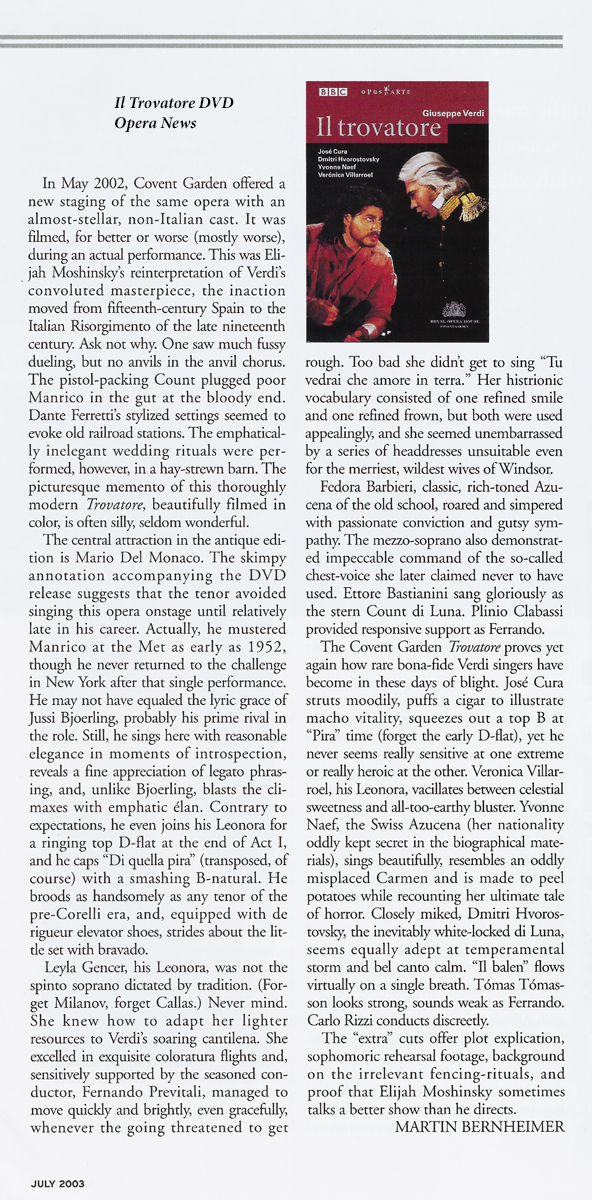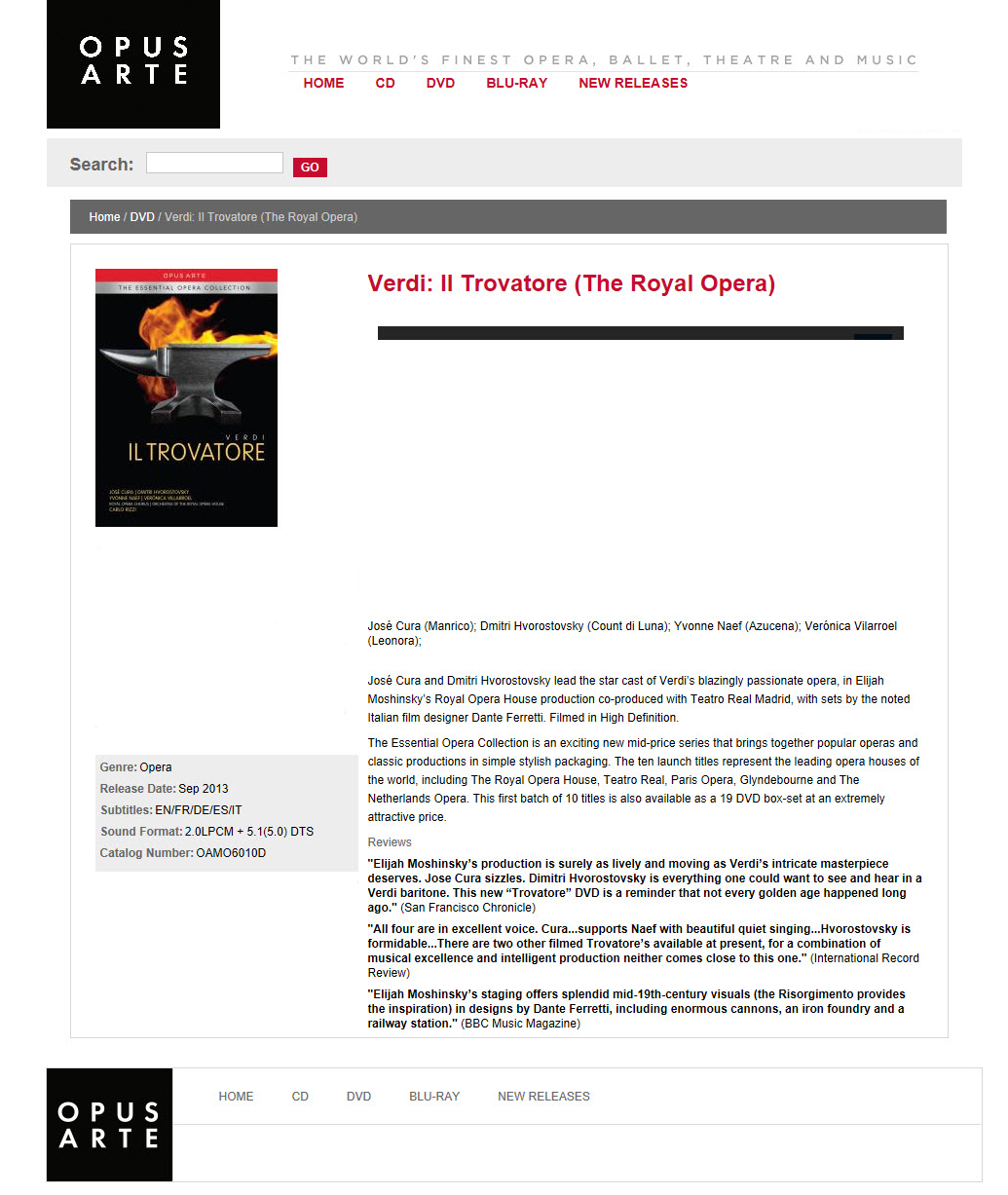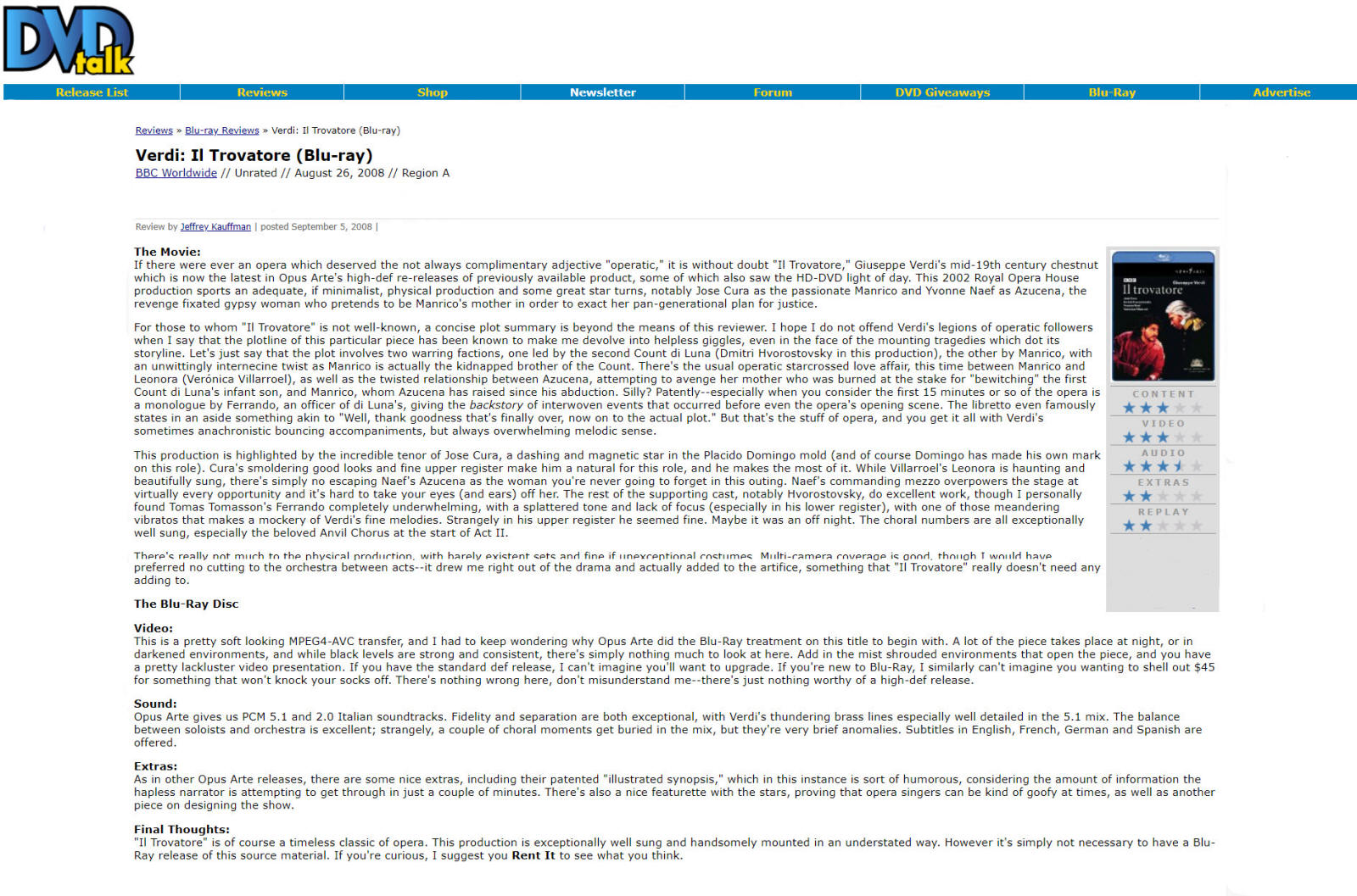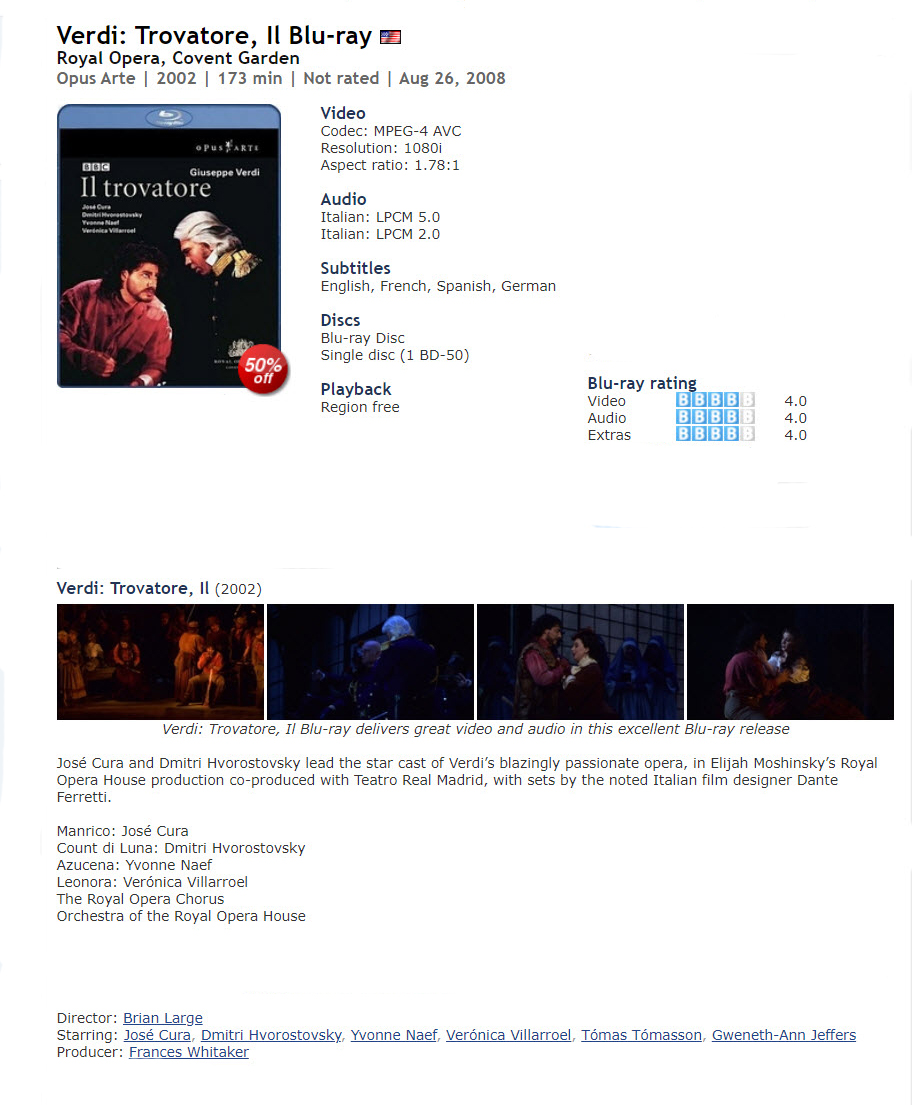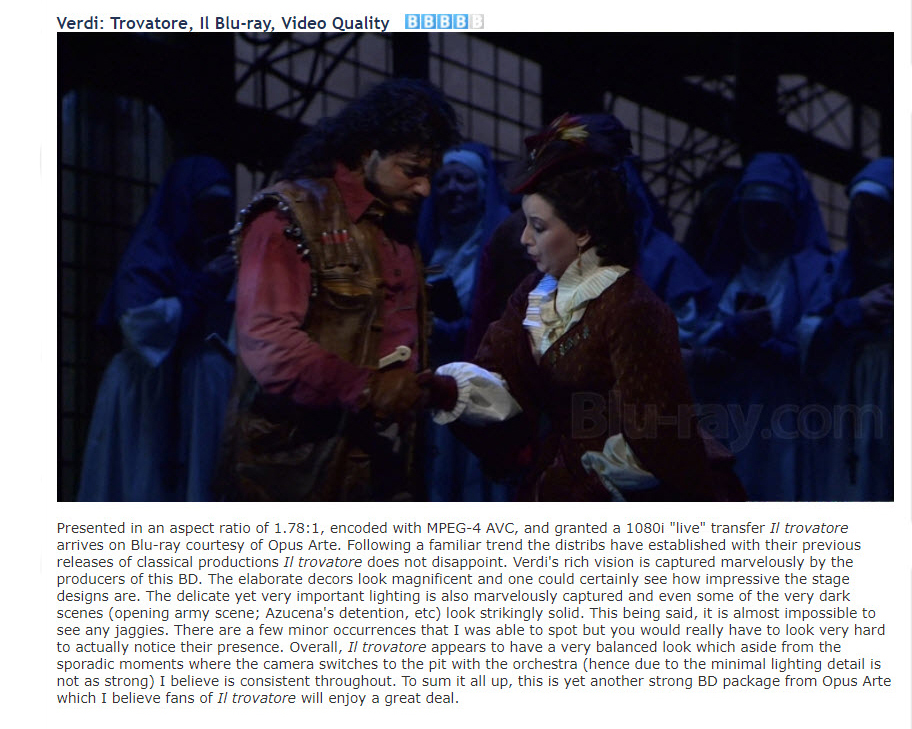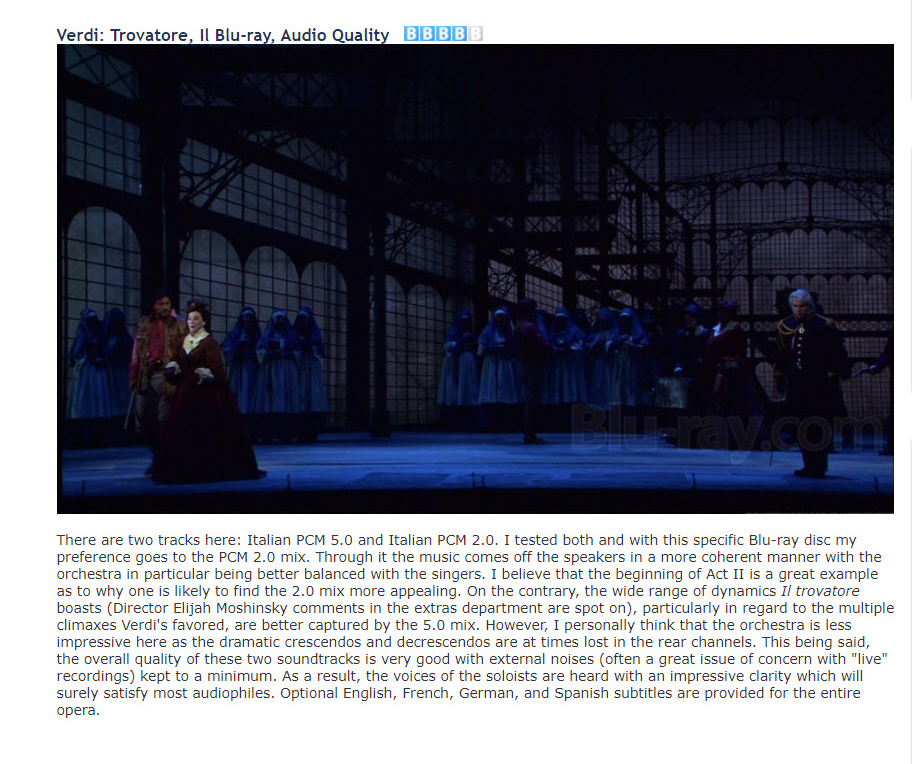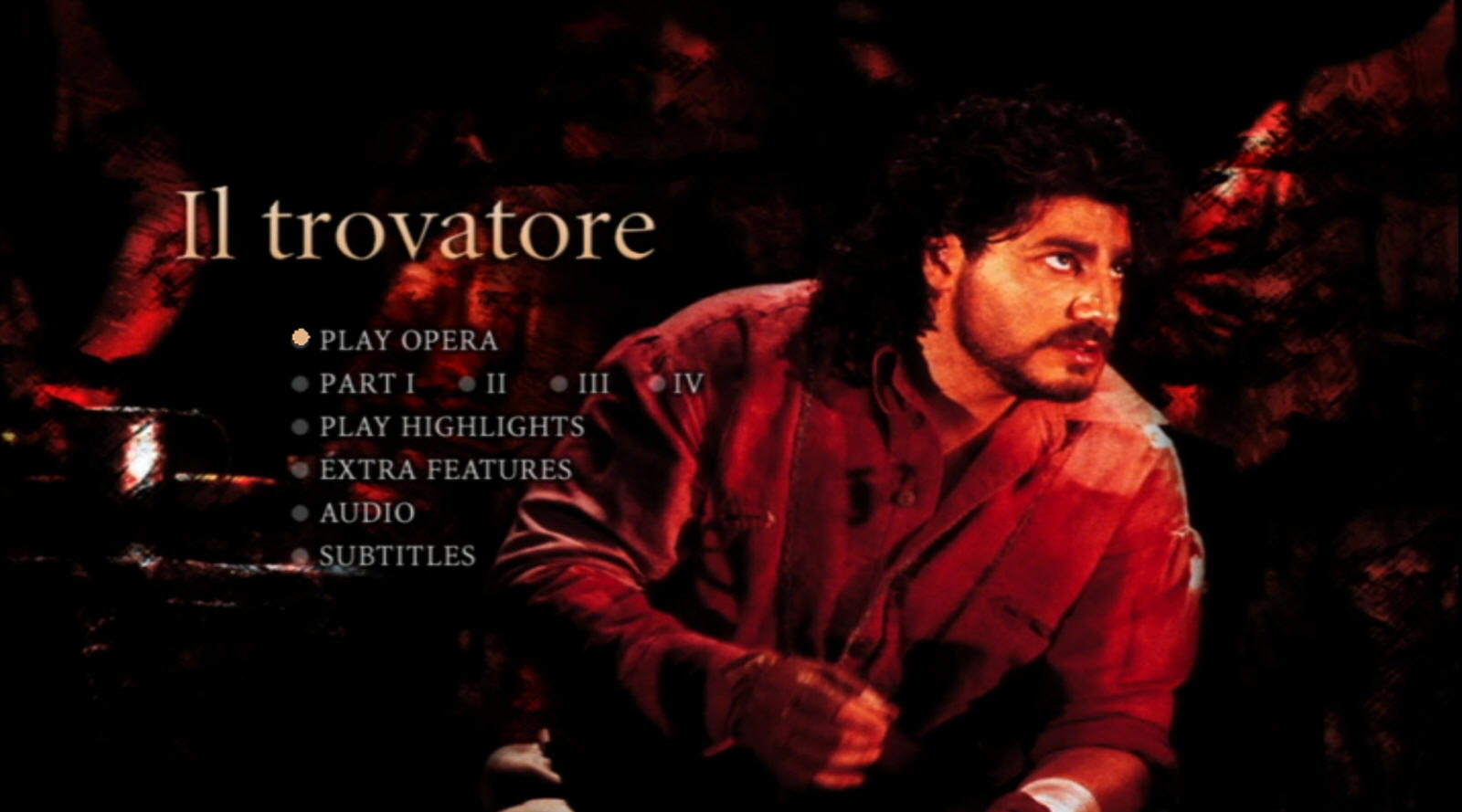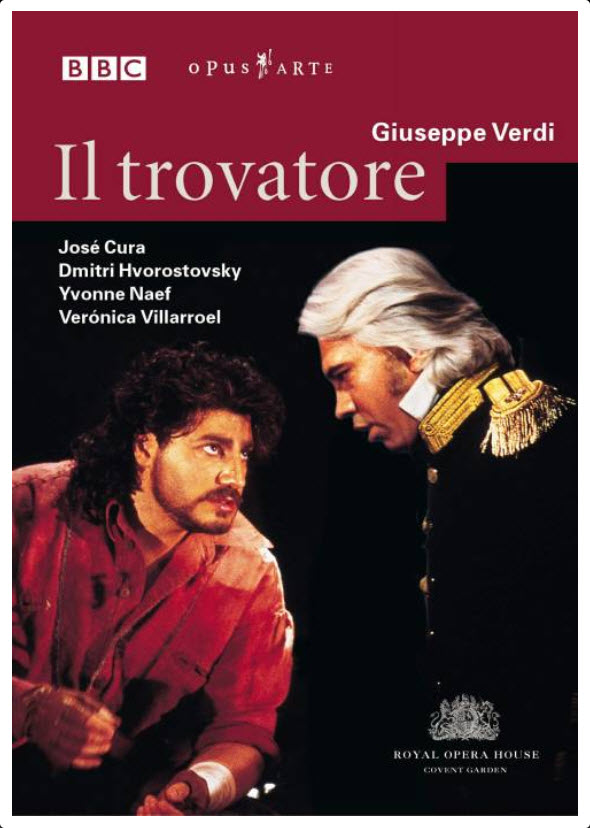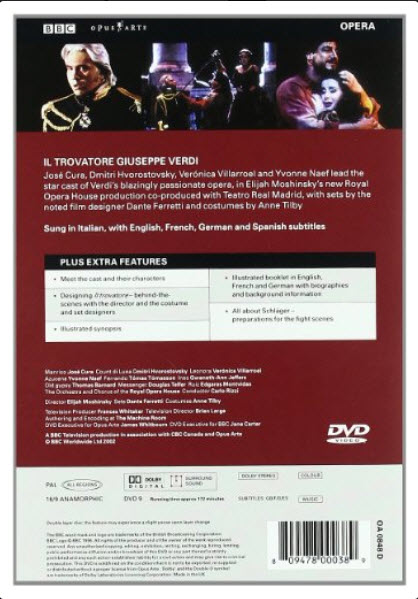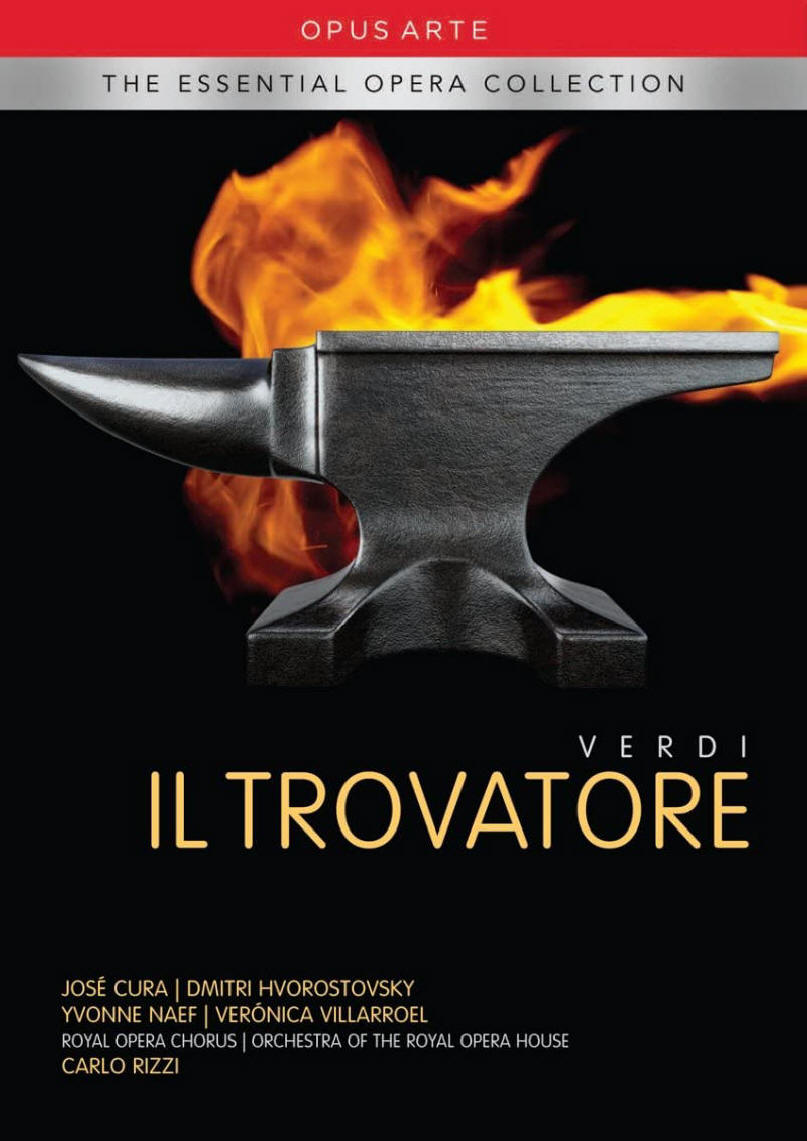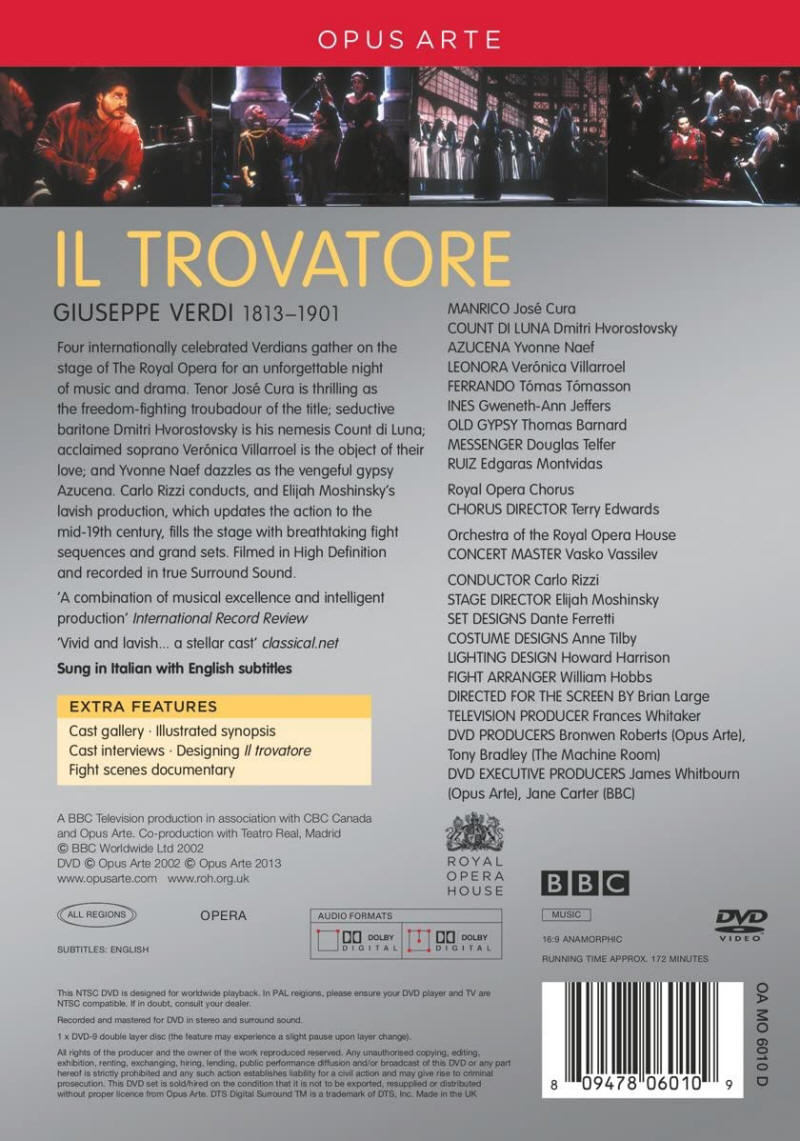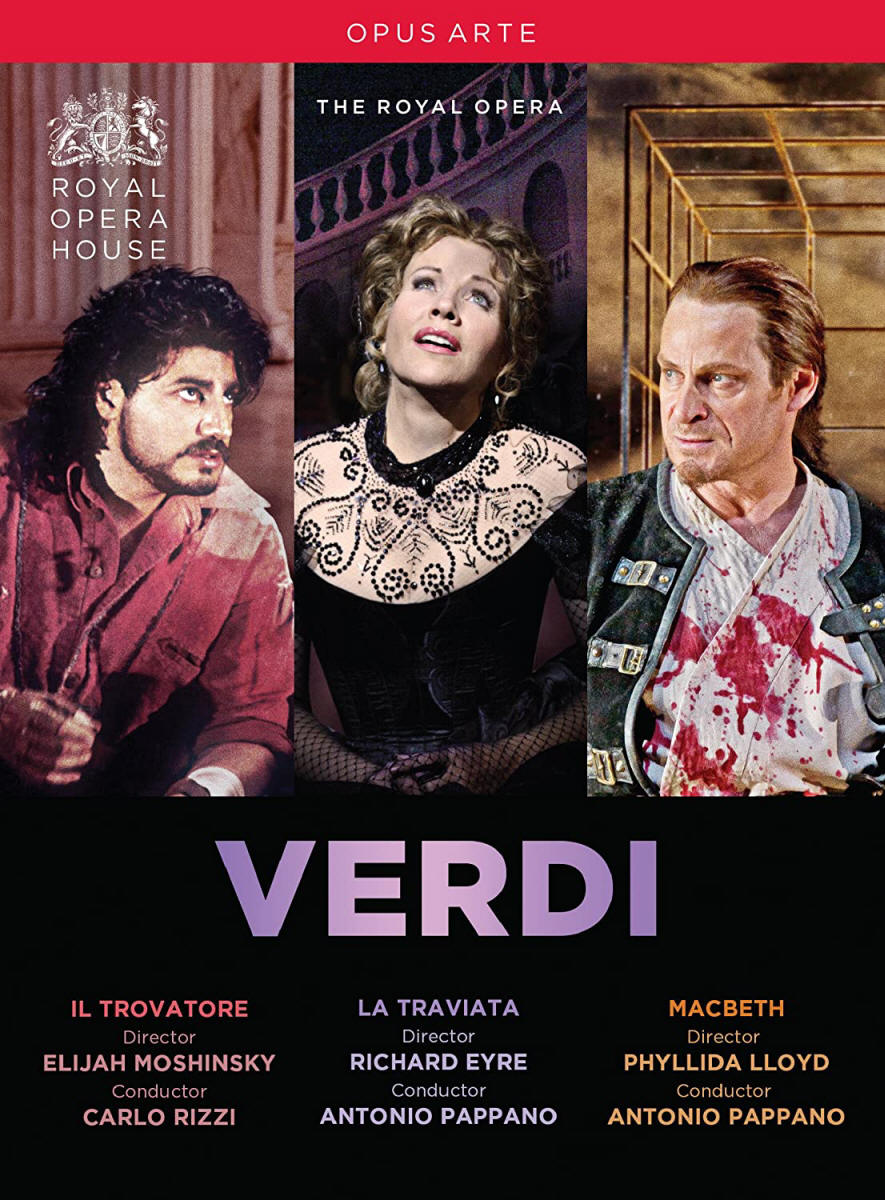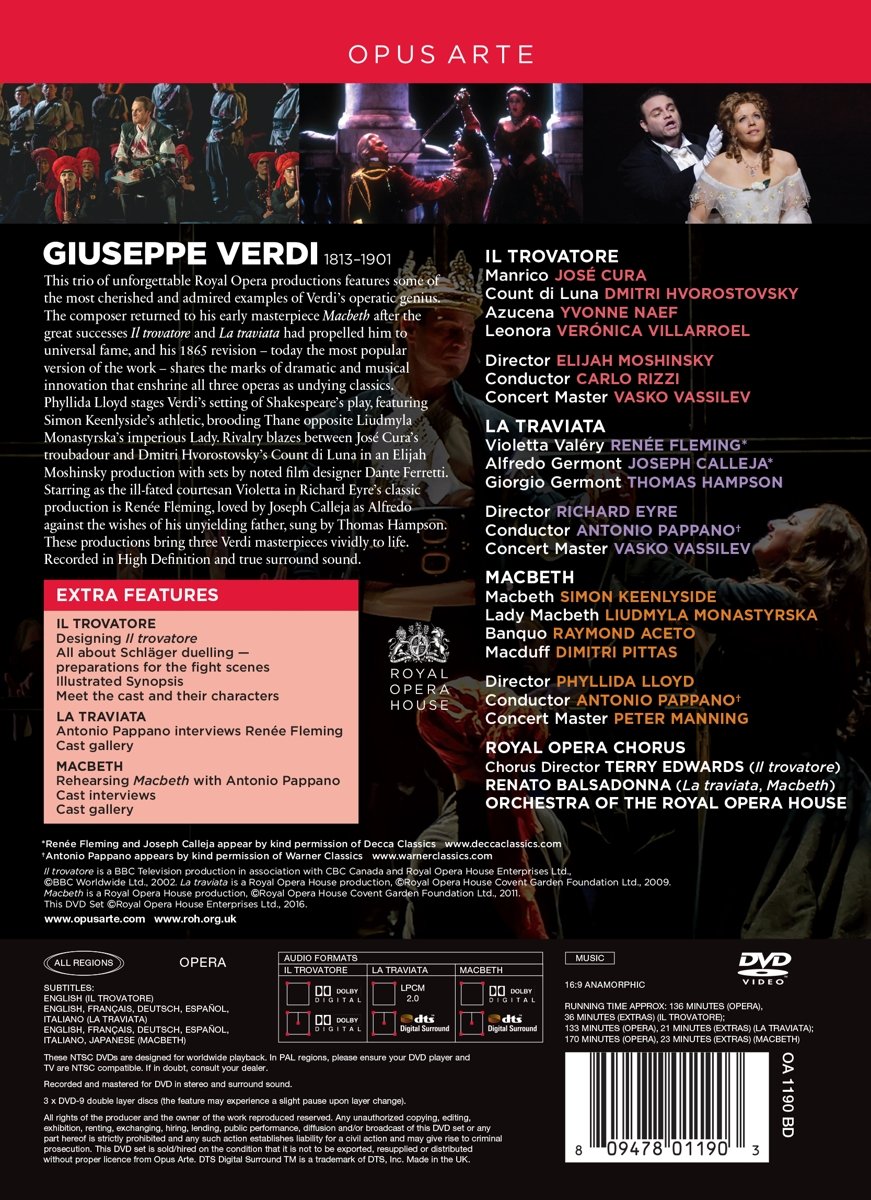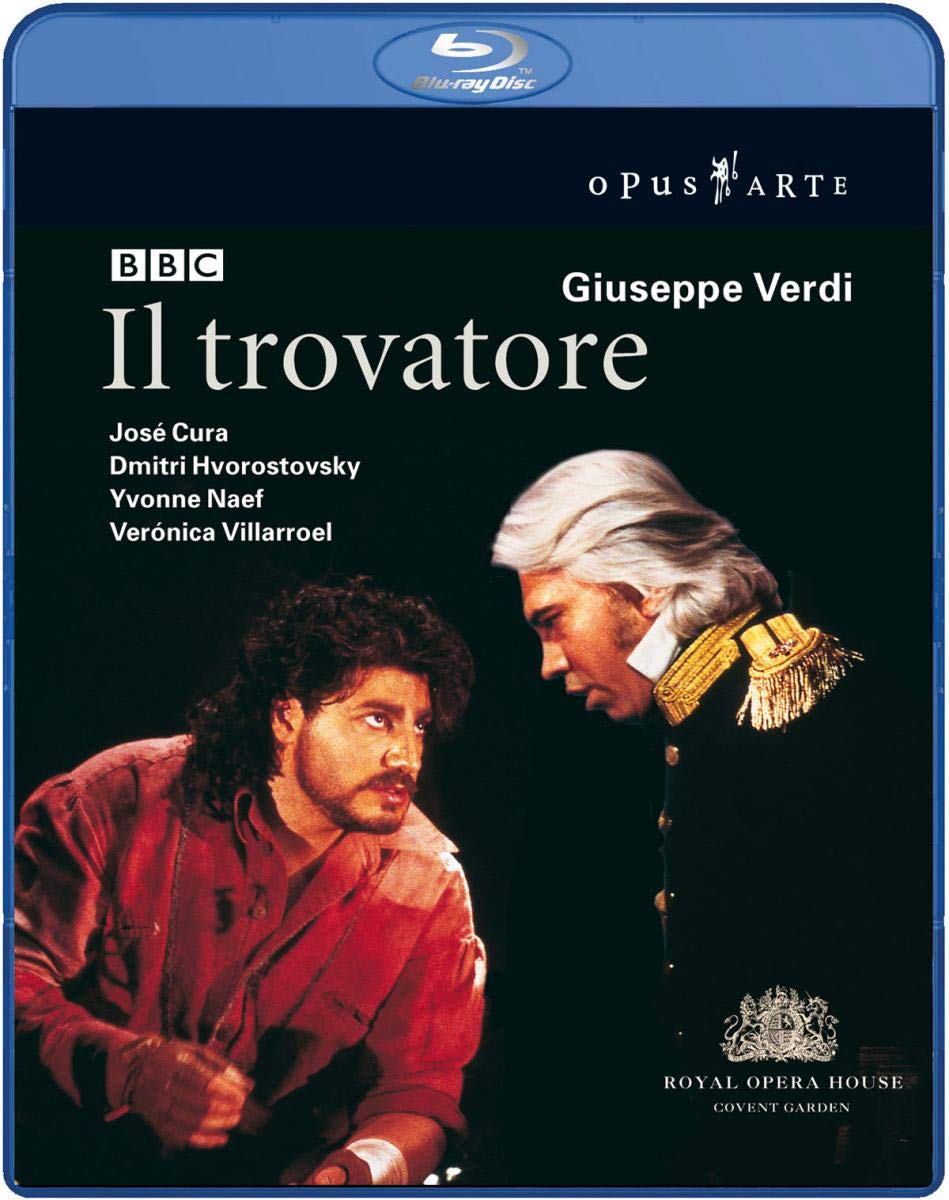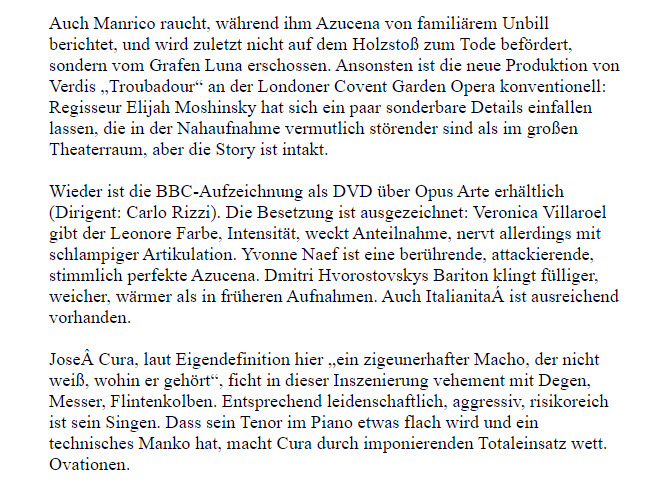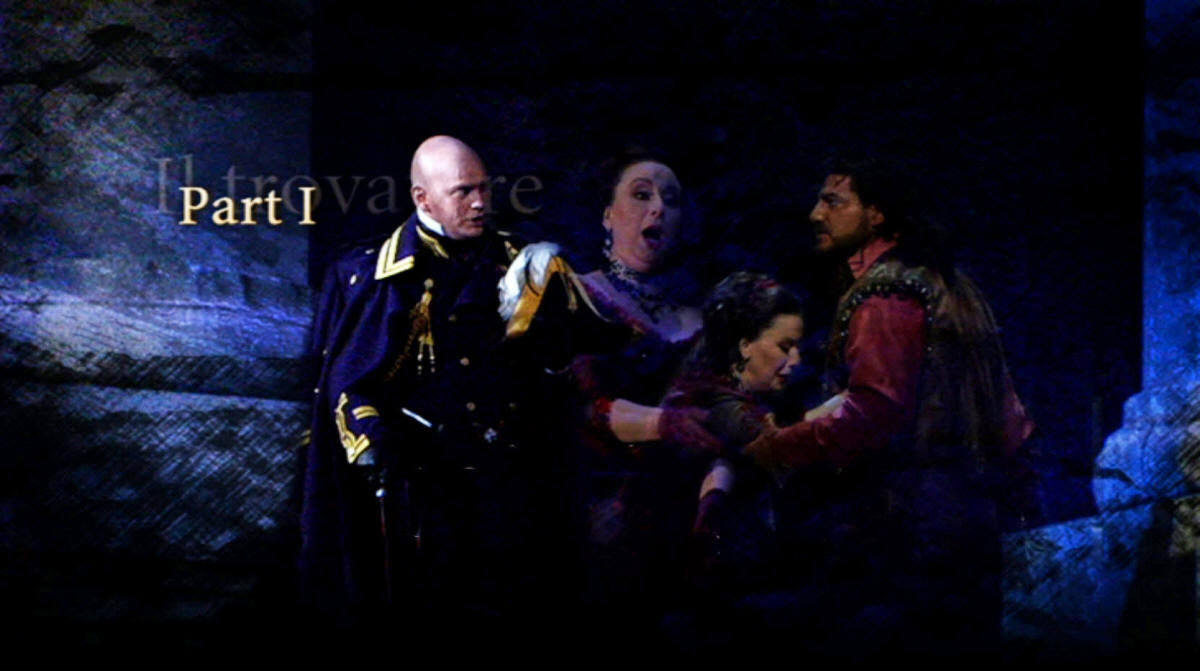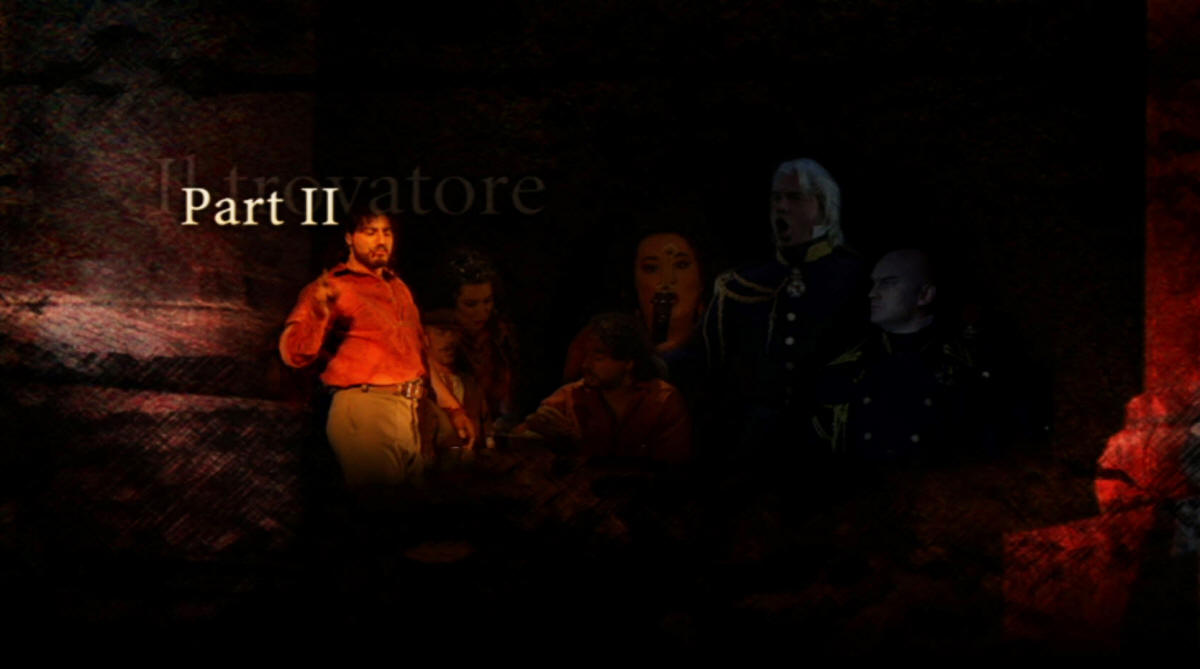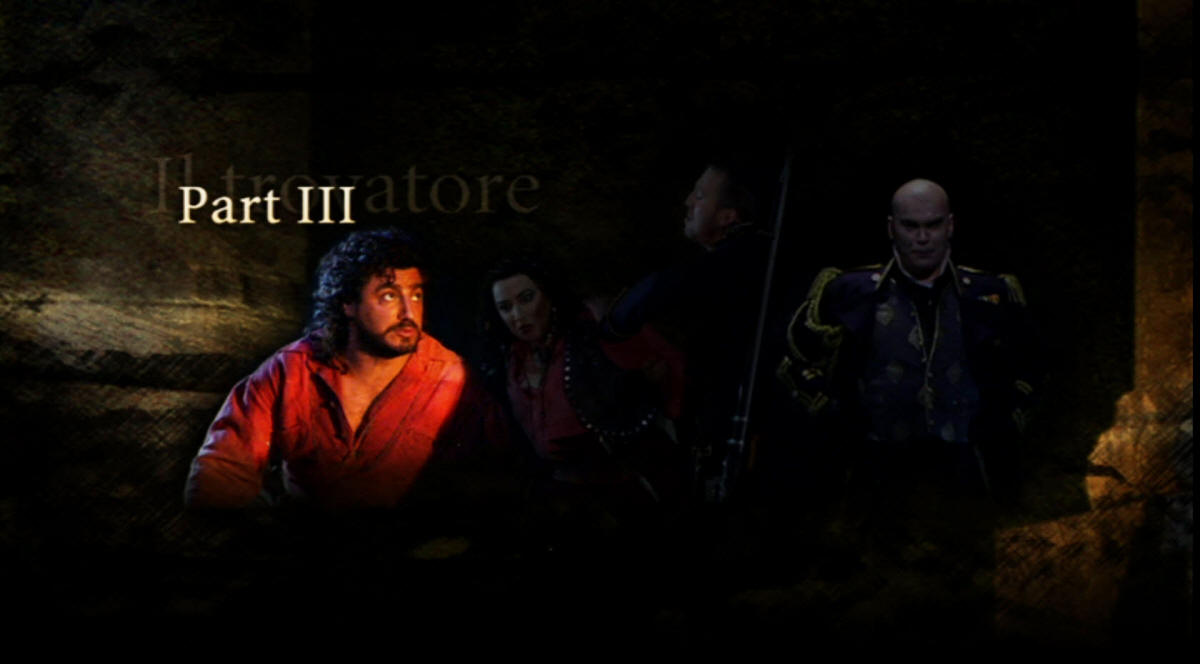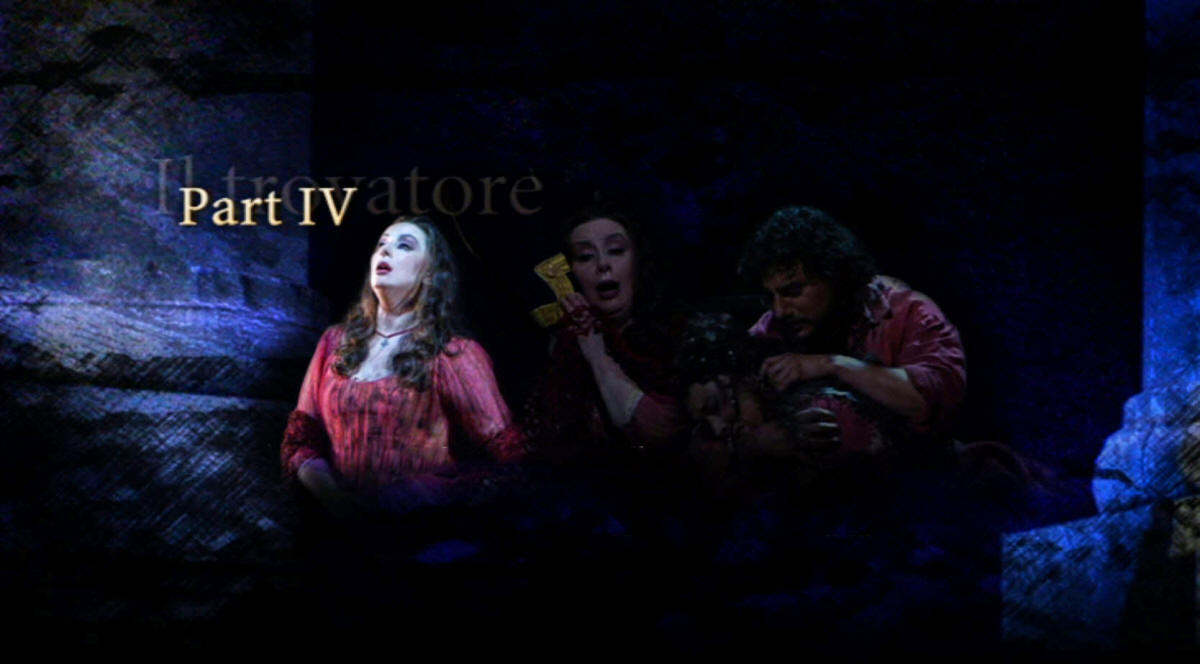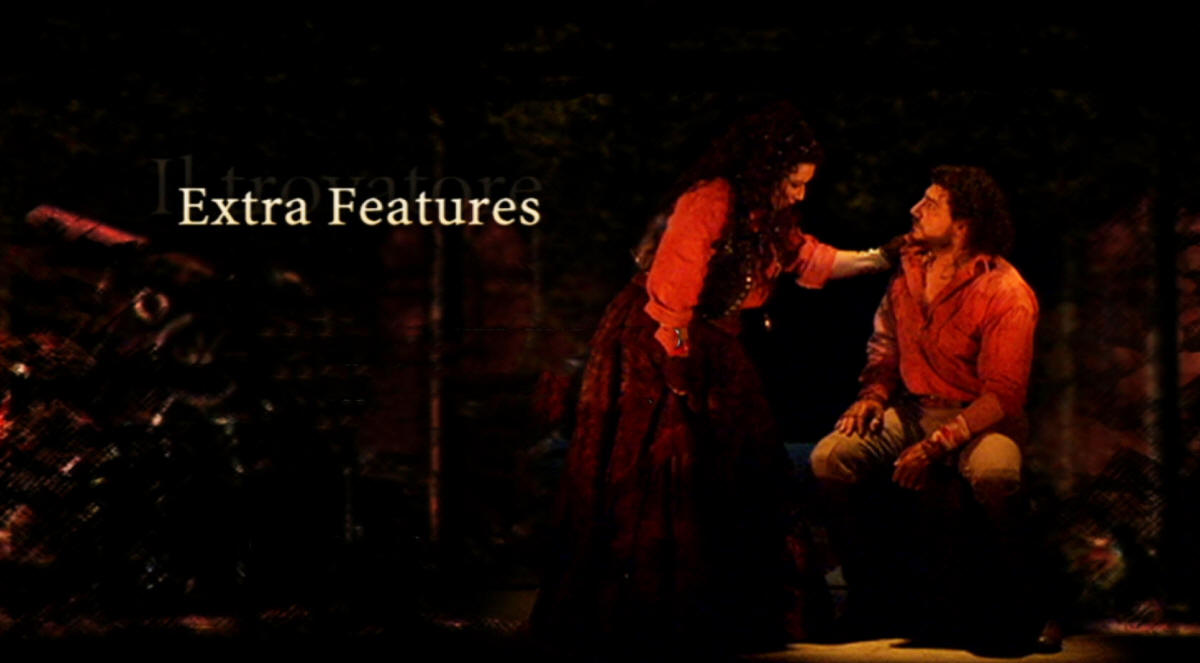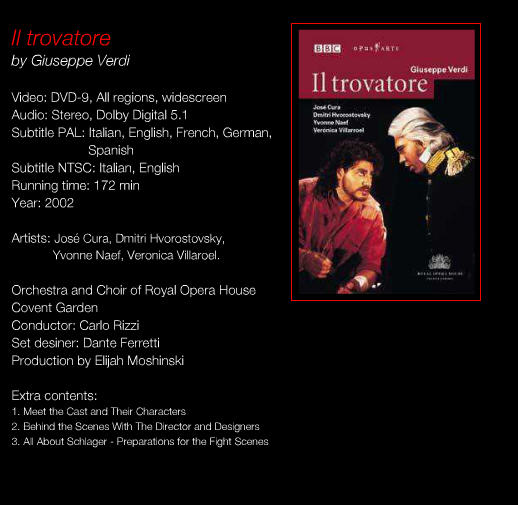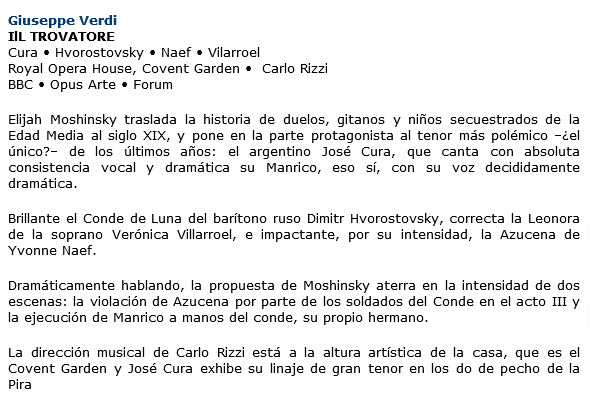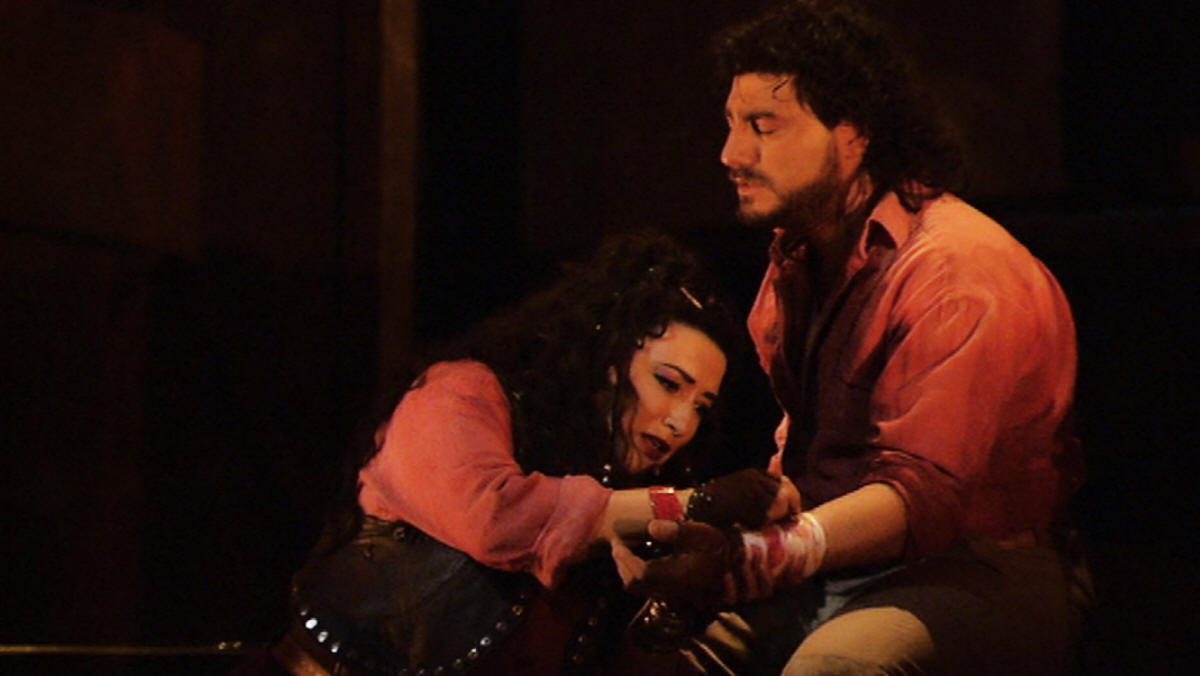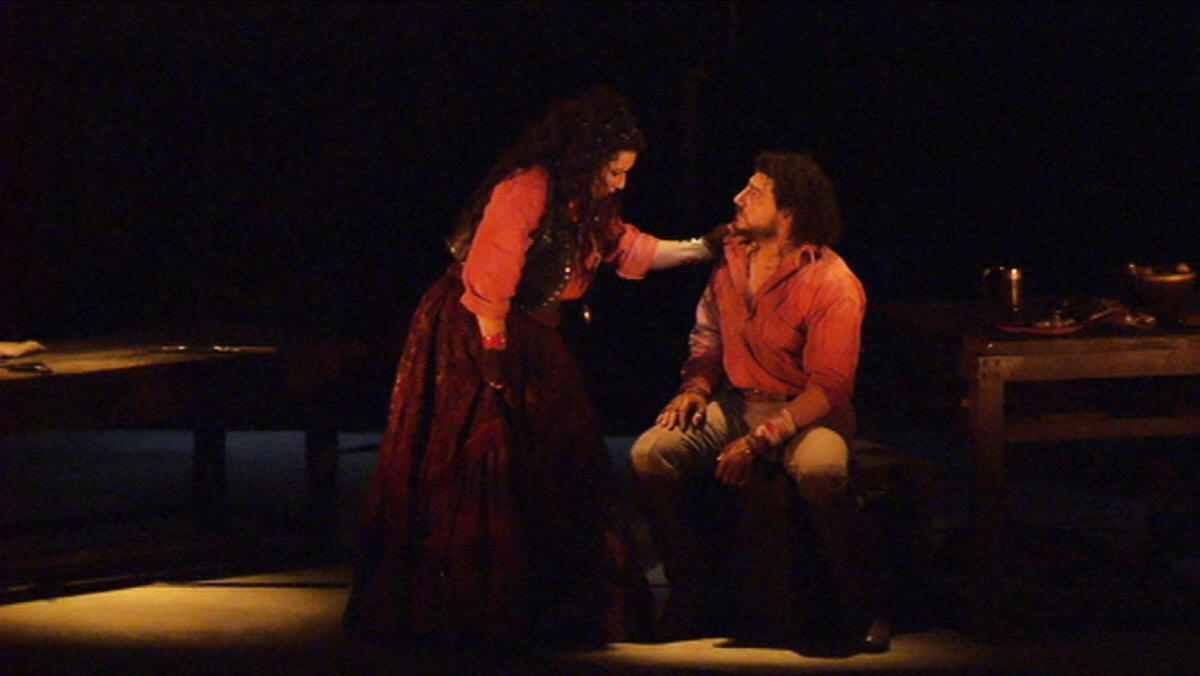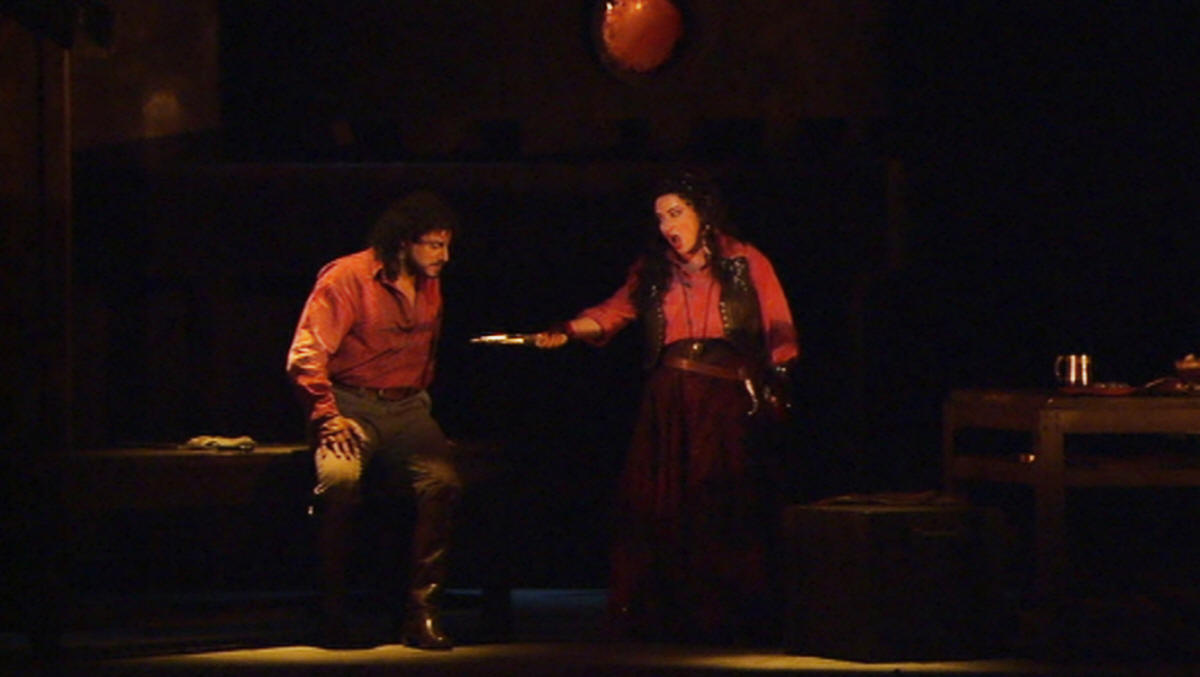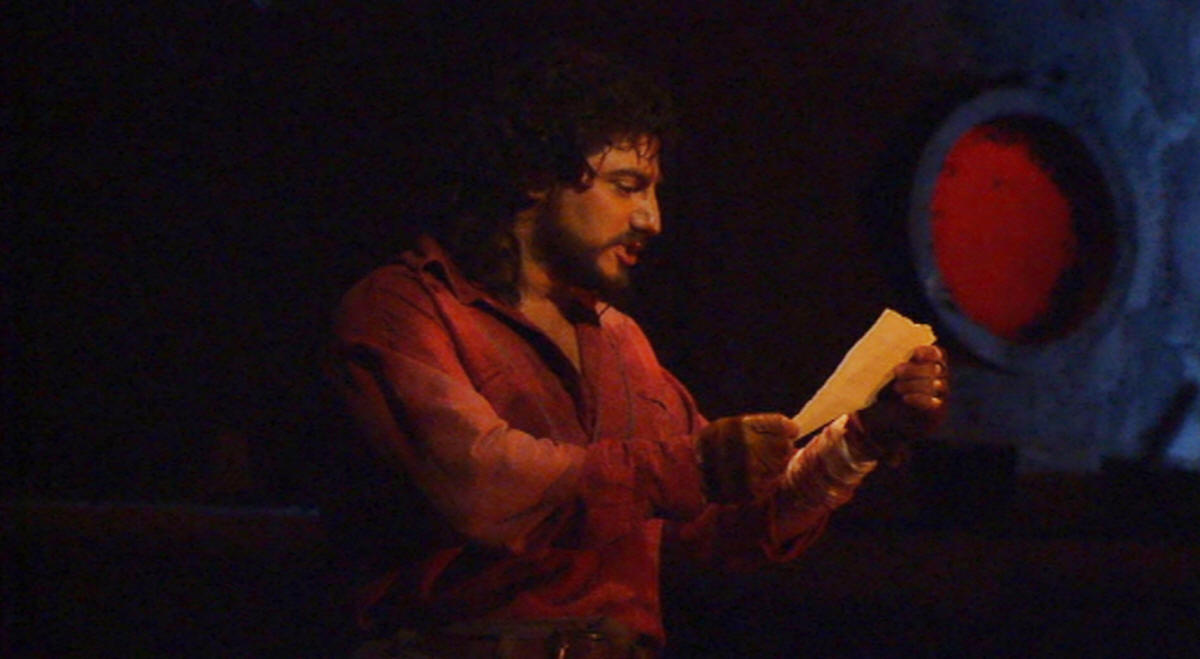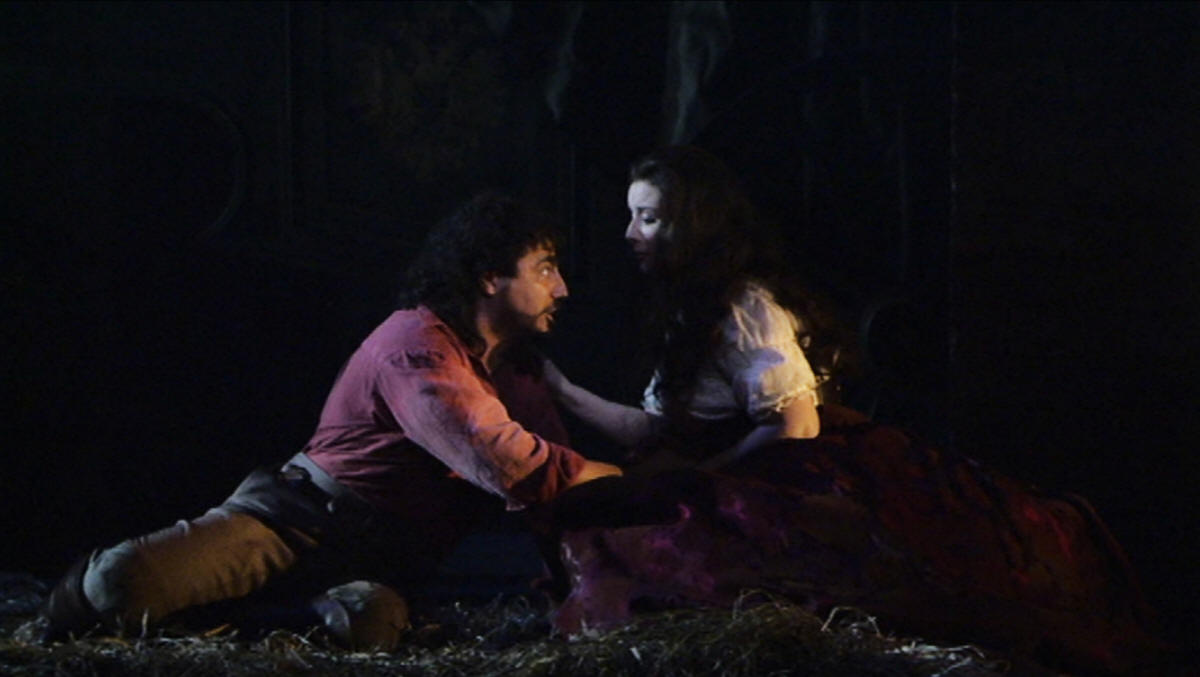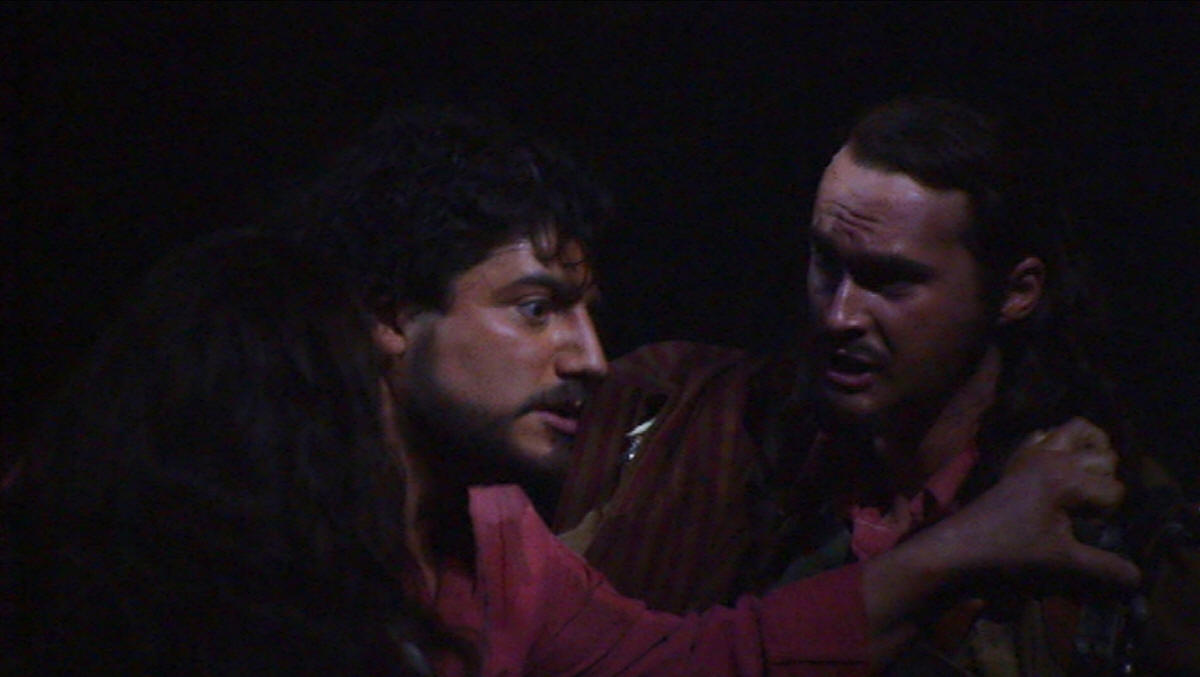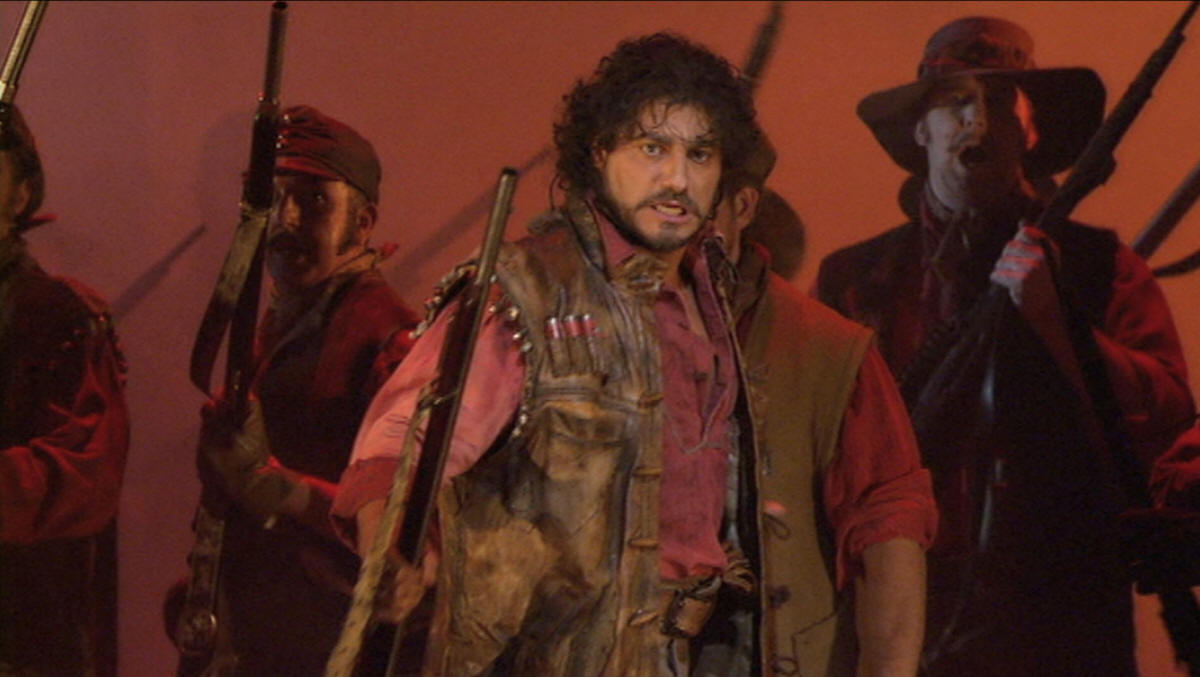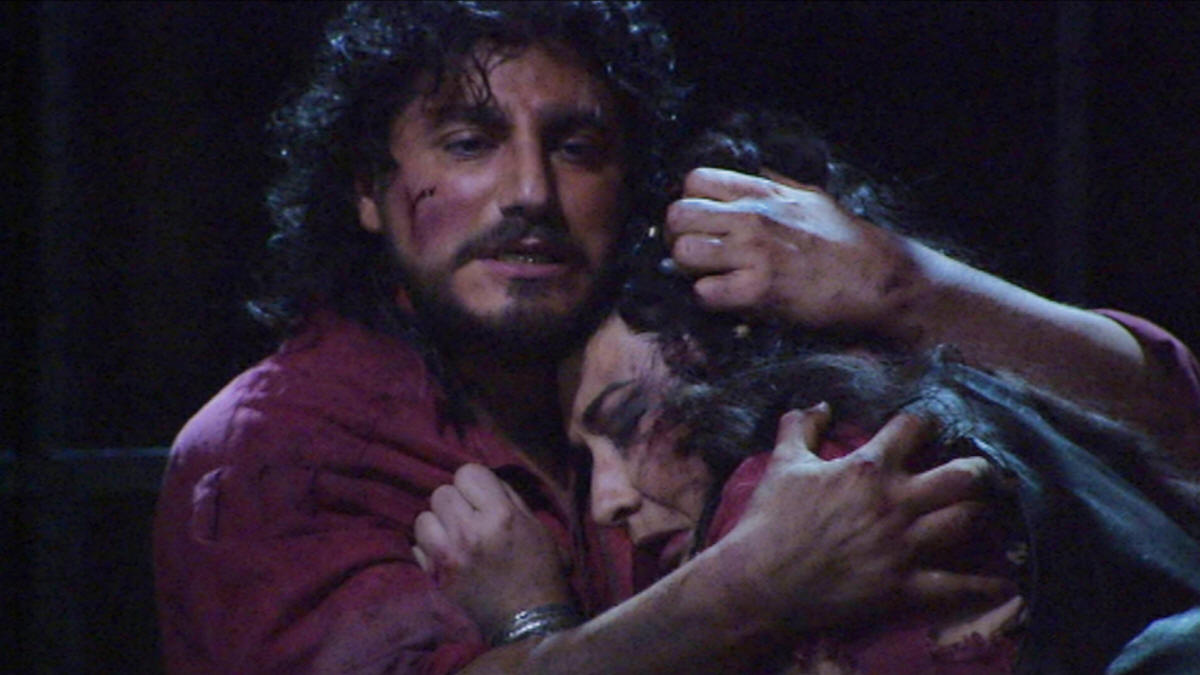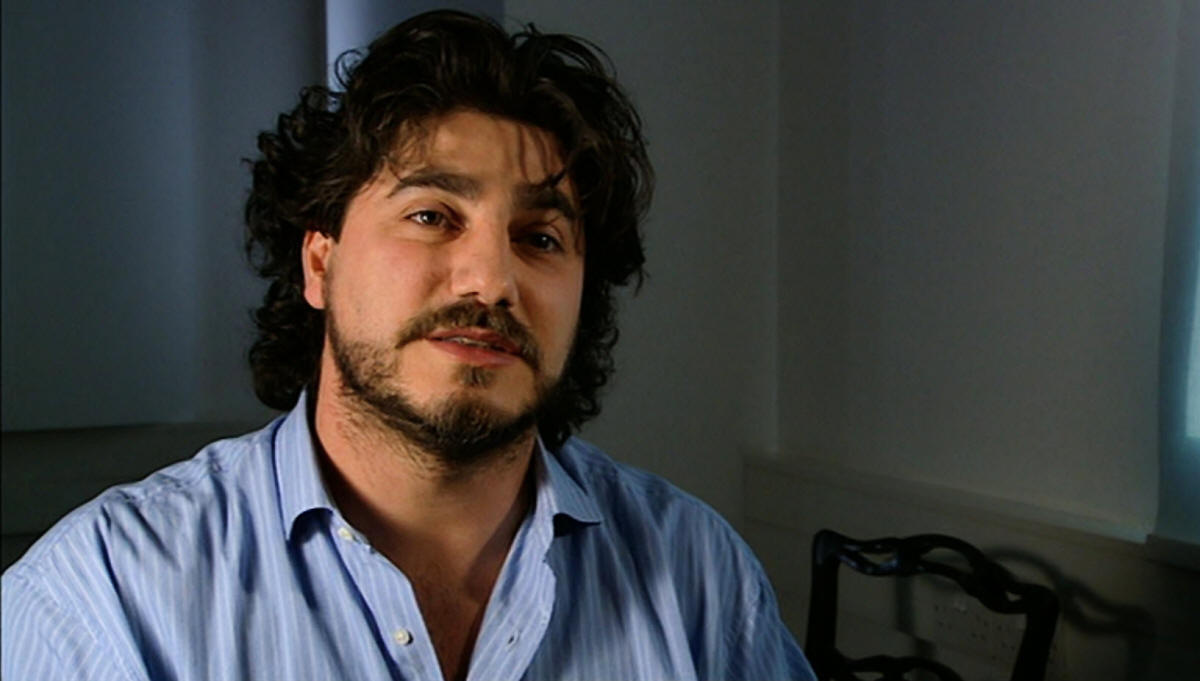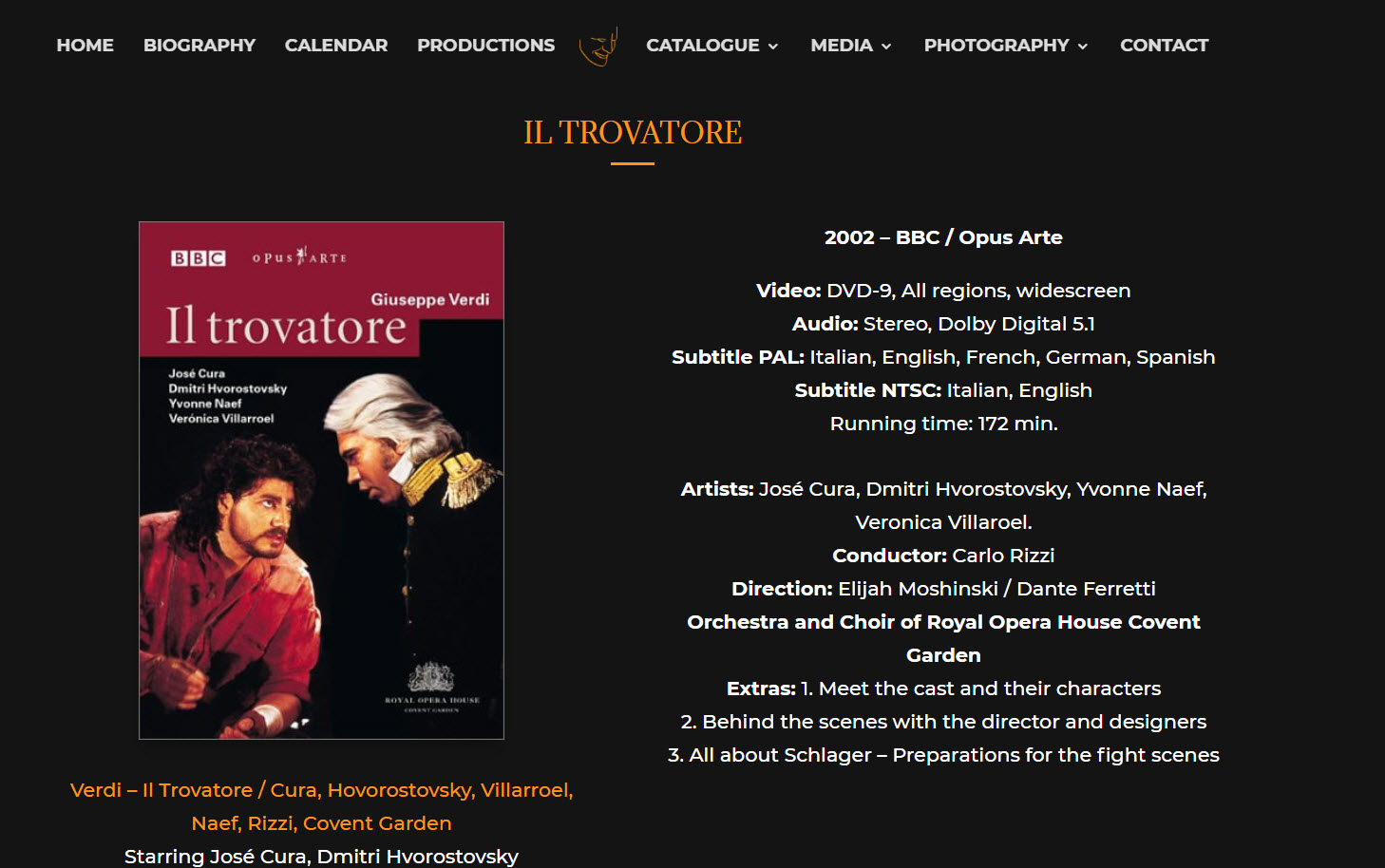
|
|
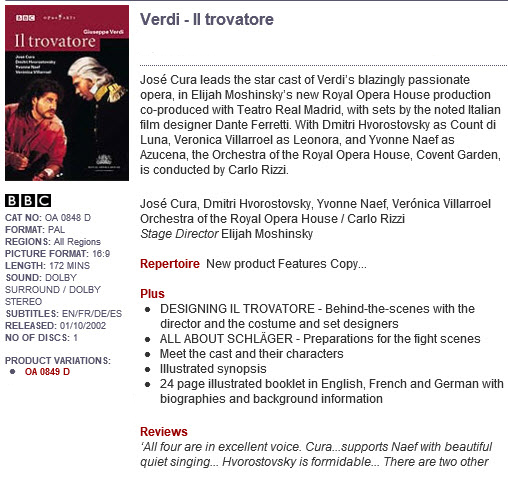 |
|
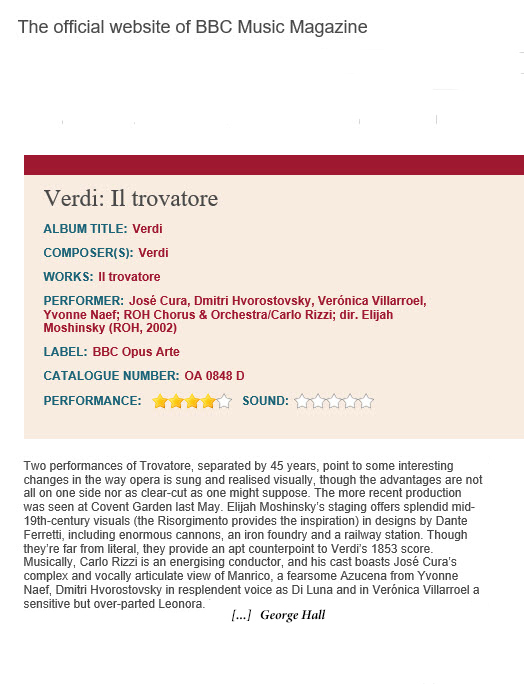
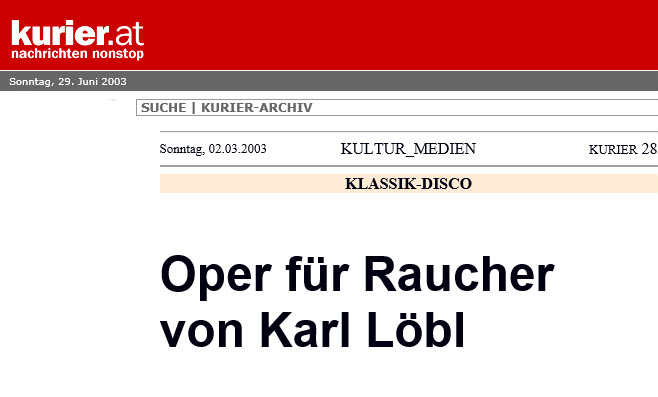 [...]
|
|
Il TrovatoreClassical Net Robert Cummings 2003 This DVD issue was drawn from a new production for the Royal Opera by Elijah Moshinsky, in conjunction with the Teatro Real, Madrid. It was recorded live on May 3, 2002 at the Royal Opera House, Covent Garden, and on the whole was a quite successful effort. It was Caruso who said that all Il Trovatore needed to succeed was the four greatest voices in the world. He made a point cleverly, but there's some truth to his claim – the opera does need a better-than-average performance to be effectively brought off owing to at least two major flaws: its libretto is ridiculous and its length is not justified. But you can't fault the music and Verdi's ability to convey drama. This effort features the brilliant Dmitri Hvorostovsky in the role of Count di Luna and as usual he is dazzling for both his singing and dramatic abilities. I'm not sure anyone else could sing this role today with quite his intensity and imaginatively sinister manner. To judge from the applause at the performance's end, however, the audience's favorite performer that night was Yvonne Naef, whose Azucena was thoroughly convincing. The two principals, José Cura and the very attractive Veronica Villarroel are also excellent here. This cast may not quite meet Caruso's ideal (what cast could?), but they surely come close. The chorus and orchestra turn in splendid work, too, as does conductor Carlo Rizzi and the other singers in the cast, Tomas Tomasson as Ferrando and Gweneth-Ann Jeffers as Ines. But, of course, in DVD recordings another factor must be considered: set designs. Here they are the work of Dante Ferretti and must be assessed as quite atmospheric and imaginative. But the darkish lighting, appropriate in many places throughout the opera, is a constant presence which some will regard as a drab feature. To me, the sets and lighting, in the end, fit the drama well, highlighting the grimmer aspects of this sordid story. Other viewers, I'll concede, will disagree. Opera initiates, or those unfamiliar with this Verdi opera, will find the story hard to follow – but then that is a flaw of any production of this Verdi work, again, owing to the complex and at times silly libretto. The sound is vivid and the production lavish overall. This is an excellent Il Trovatore, with a stellar cast, and is well worth the attention of opera mavens.
|
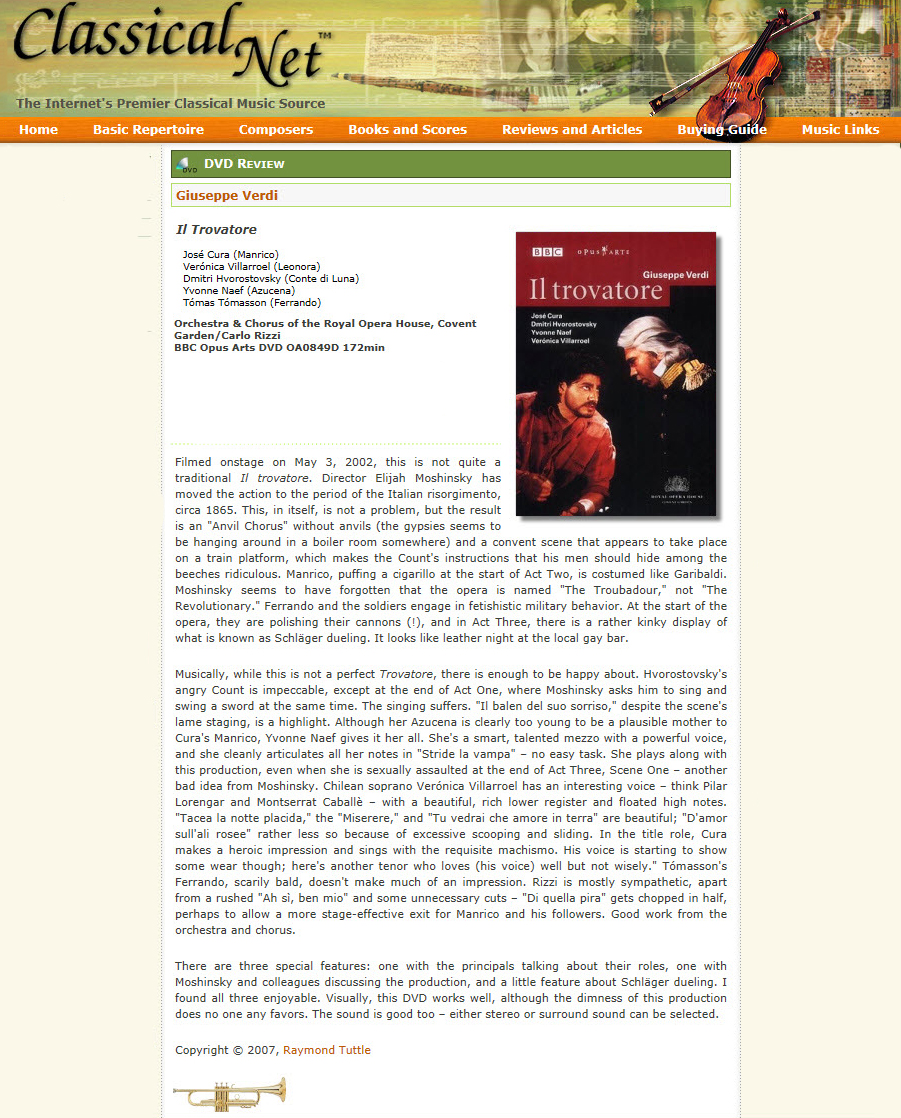
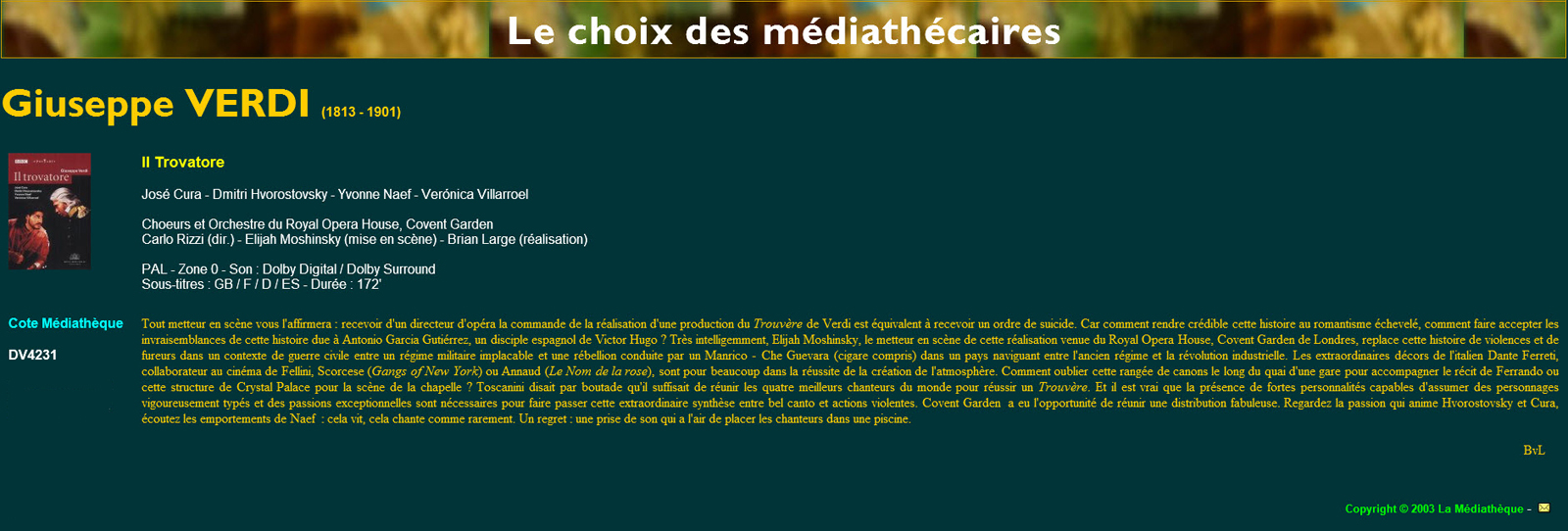
|
Note: This is a machine-based translation. We offer it only a a general guide but it should not be considered definitive.
Giuseppe VERDI : "Il Trovatore"
Musique Classique Benoit van Langenhove March 2003
Any director will tell you: receiving a commission from an opera director for a production of Verdi's Il Trovatore is equivalent to receiving a suicide order. Because how can one make this story, written by Antonio Garcia Gutiérrez, a Spanish disciple of Victor Hugo, with its wild romanticism and implausibilities, credible? Very intelligently, Elijah Moshinsky, the director of this production from the Royal Opera House, Covent Garden in London, places this story of violence and fury in a context of a civil war between a relentless military regime and a rebellion led by a Manrico - Che Guevara (cigar included) in a country navigating between the old regime and the industrial revolution. The extraordinary sets by the Italian Dante Ferreti, a collaborator on the films of Fellini, Scorsese or Annaud, are by and large successful in creating the atmosphere. How can we forget the row of cannons along the platform of a railway station to accompany the Ferrando’s story or the Crystal Palace structure in the convent scene? Toscanini jokingly said that it was necessary to bring together the four best singers in the world to succeed in an Il Trovatore. And it is true that the presence of strong personalities capable of assuming vigorously typified characters and exceptional passions are necessary to convey this extraordinary synthesis between bel canto and violent actions. Covent Garden had the opportunity to assemble a fabulous cast. Watch the passion that animates Hvorostovsky and Cura, listen to Naef's outbursts: it lives, it sings as rarely before.
|
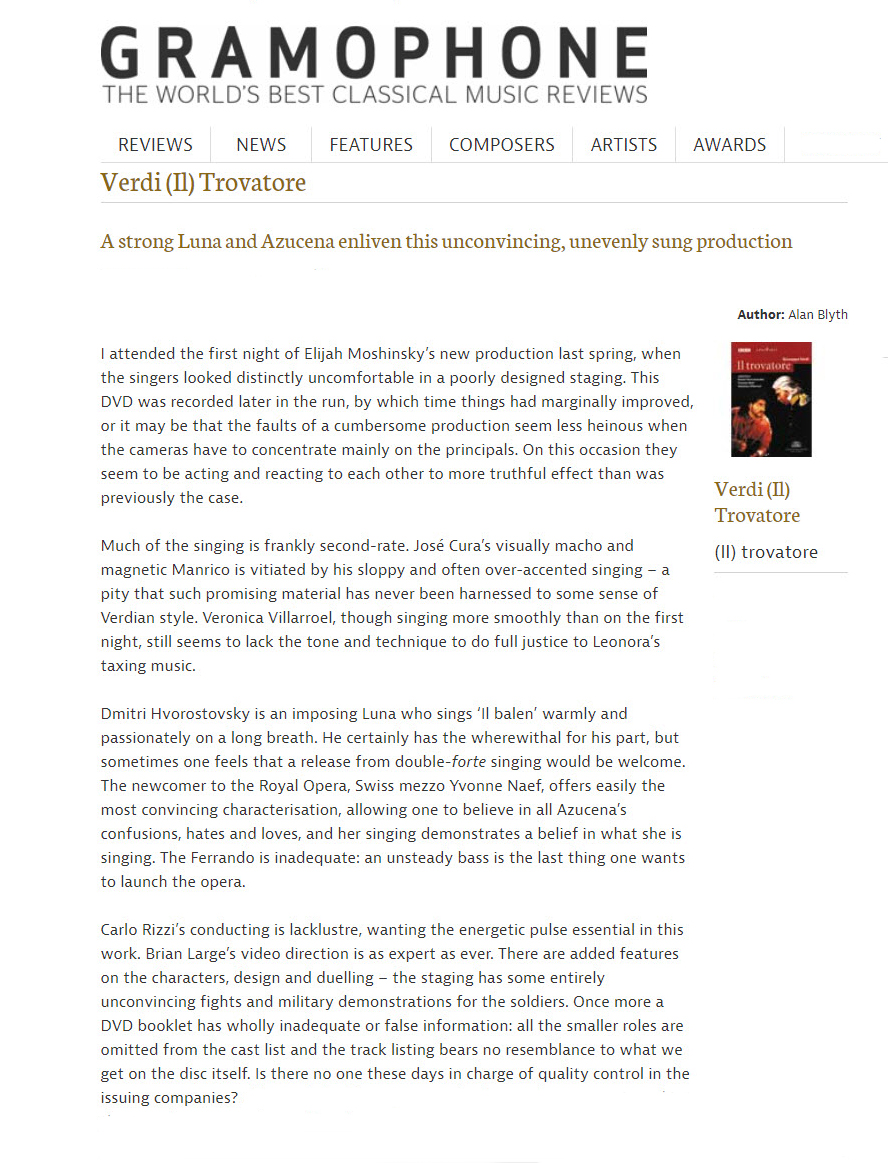
|
|
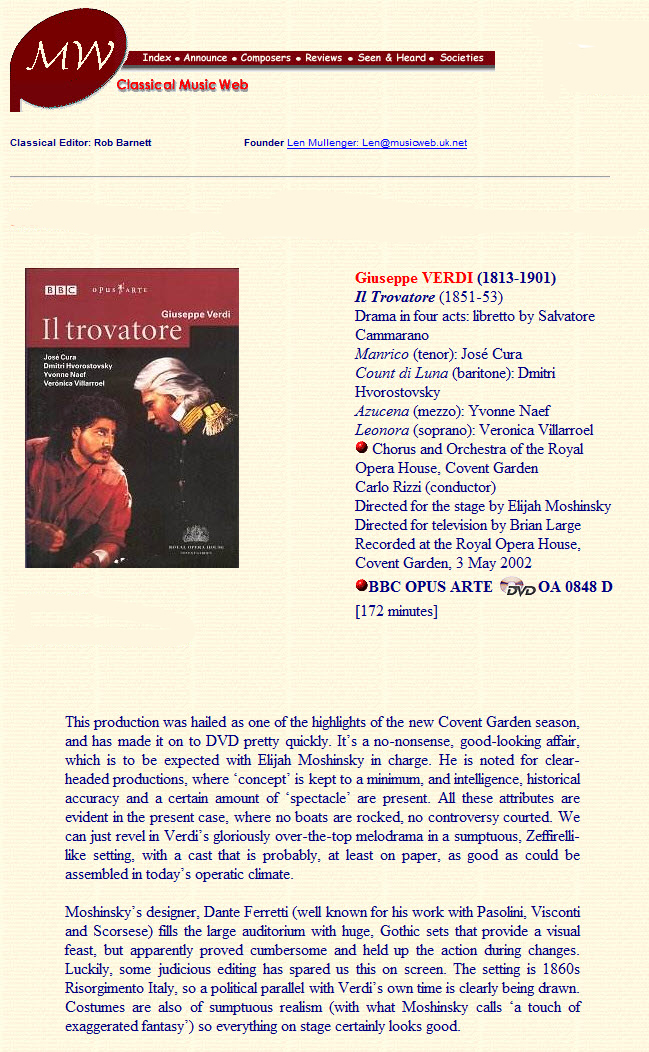
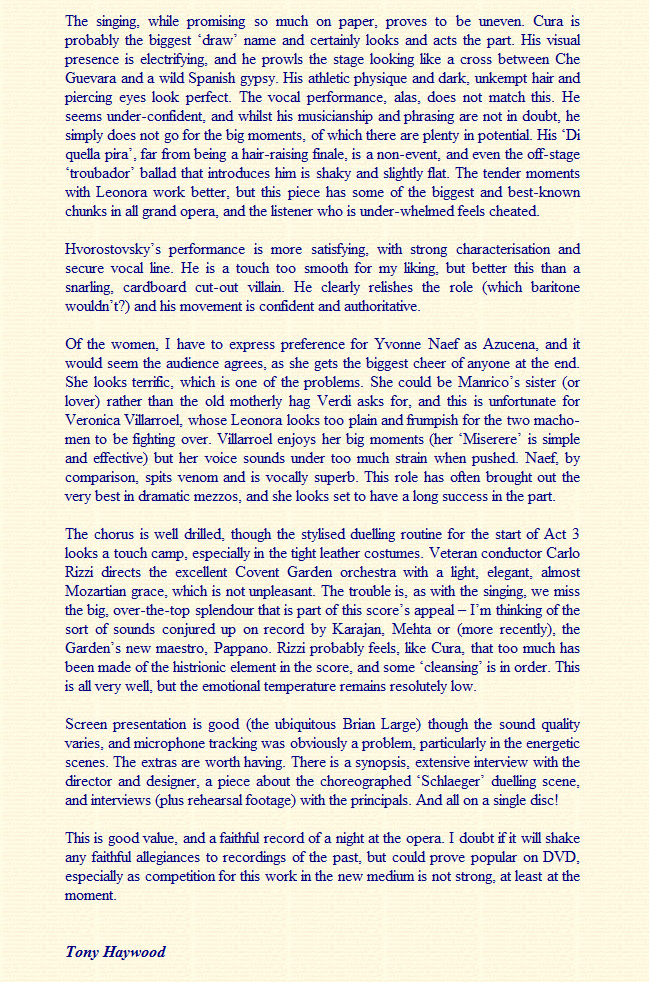
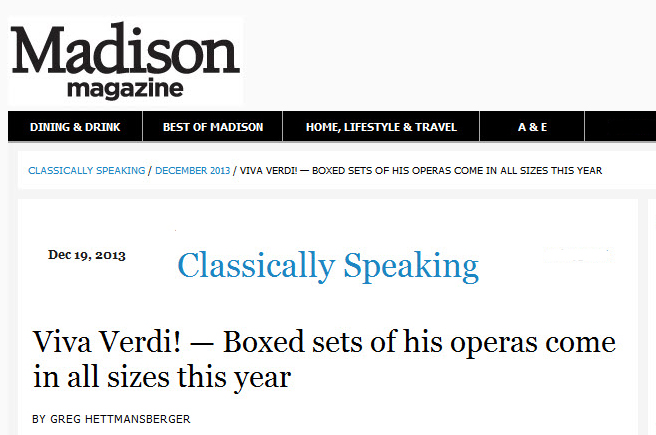
[...]
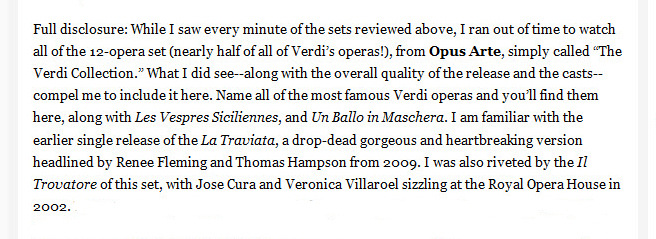
|
|
|
|
|
|
|
|
|
|
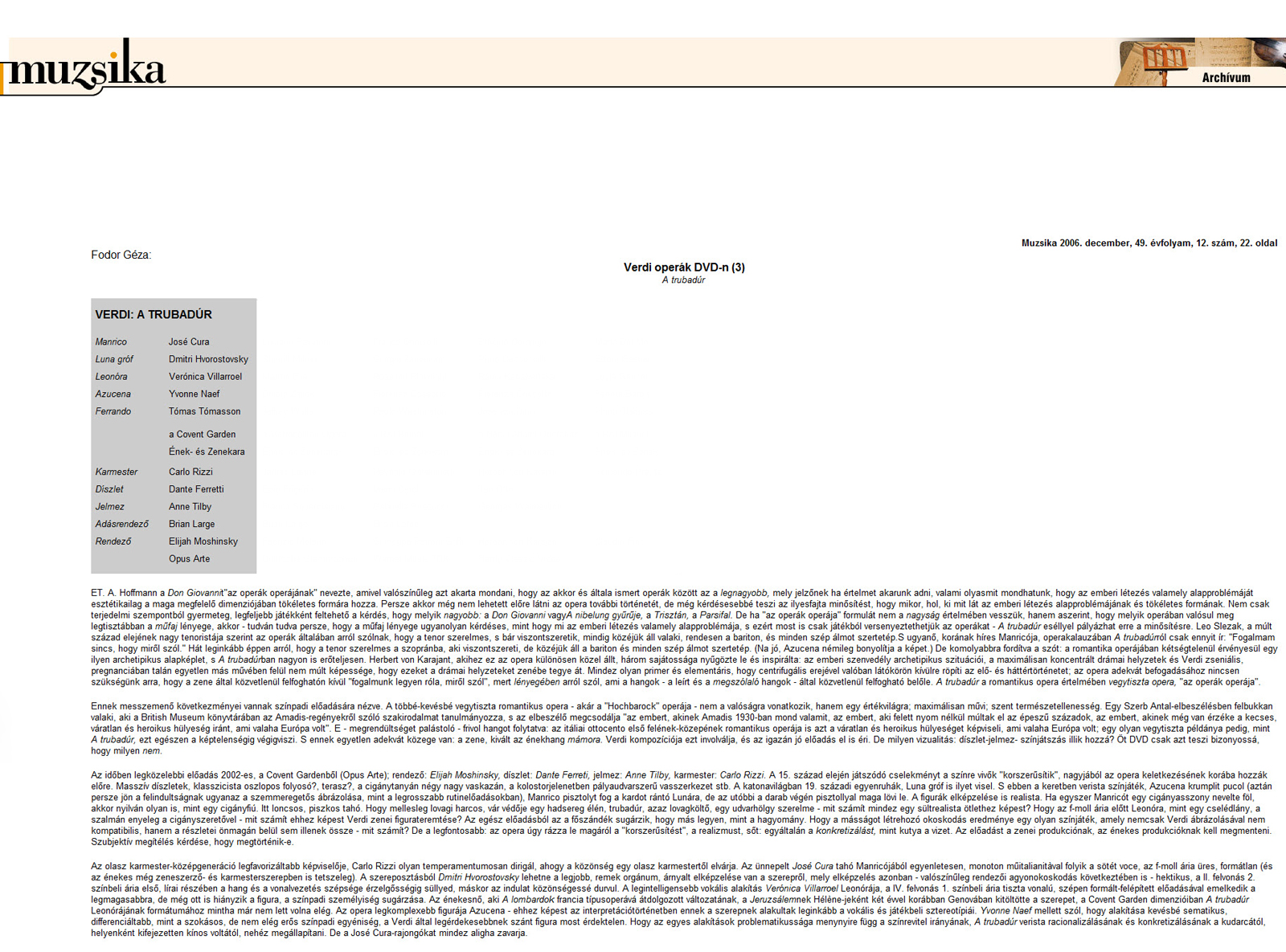
|
Note: This is a machine-based translation. We offer it only a a general guide but it should not be considered definitive.
Verdi operák DVD A trubadúr
Muzsika Fodor Géza December 2006
[Excerpt] […] But if we take the formula "opera of operas" not in terms of greatness but in terms of which opera essentially realizes the essence of the genre, Il trovatore has a chance to be that opera. Leo Slezak, a great tenorist at the beginning of the last century, wrote (of this opera), "I have no idea what it's about." Well, basically, it’s just a story of a tenor in love with the soprano, who loves him in return, but the baritone stands between them. (Azucena complicates the picture a bit.) But more seriously, the archetypal basic formula found in the opera of romance is particularly strong in Il trovatore. Herbert von Karajan, who was fond of this opera, was fascinated and inspired by three features: the archetypal situations of human passion, the maximally concentrated dramatic situations, and Verdi’s ingenious ability, perhaps unmatched in any other work, to translate these dramatic situations into music. All of this is so primal and elemental that, with its centrifugal force, to adequately present the opera, we do not need to have "an idea of what it is about" other than what is directly perceptible by the music, because it is essentially about what can be perceived directly from its sounds. Il trovatore is a pure opera in the sense of romantic opera, "the opera of operas." […] The closest performance in time is from 2002, from Covent Garden (Opus Arte). The plot, set at the beginning of the 15th century, is "modernized" by those who have brought it to the stage, roughly bringing it forward to the era of the opera's origin. Massive scenery, a classical colonnade corridor, a terrace, four large iron boilers, a railway-like iron structure in the monastery scene, etc. The military, including Count di Luna, wear 19th century military uniforms. And within this frame, the work becomes veristic. Azucena peels potatoes (with, of course, the same eye-catching depiction of excitement as in the worst routine performances), Manrico takes a gun to Luna, who in turn pulls his sword, but then at the end of the piece the latter shoots the former with a gun. The concept of the characters also become realistic: if Manrico was raised by a gypsy woman, then he must obviously be a gypsy boy, a loathsome dirty bastard. If, by the way, he is actually a knightly warrior, a defender of a castle who leads an army, a troubadour—that is, a knight poet, worthy of the love of a lady-in-waiting—what does any of this have to do with the projection of verismo? Or that Leonora sits on straw beside her Gypsy lover like a servant girl—what does Verdi’s actual musical character matter in comparison? The primary intention of this entire production just seems to be something different from tradition. The result of the reasoning to create otherness is an opera that is not only incompatible with Verdi’s depiction, but that in its details do not fit within itself. [As a result of this incompatibility] the production must be saved by the musical performance, the singing performances. It is a matter of subjective judgment as to whether it happens. Carlo Rizzi, the most favored representative of the Italian middle conductor generation, conducts as temperamentally as the audience would expect from an Italian conductor. The celebrated tenor José Cura was Manrico, his dark voice flowing evenly if with monotonous affectation, the famous aria empty, formless (surprising since the singer works as a composer and conductor). Dmitri Hvorostovsky could have been the best of the cast, with his nuanced idea of the role, but—probably due to the director's brainstorming—in the second half the beauty of sound and vocal line sinks into sentimentality; at times the passion becomes vulgar. The most intelligent vocal shaping is from Verónica Villarroel’s Leonora, with a clean-line, beautifully shaped performance, but she lacks the radiance of the figure, the theatrical personality. Azucena is the most complex figure in opera. Yvonne Naef argues that her portrayal is more differentiated than the usual but without a strong stage personality, the figure that Verdi intended to be most interesting is now the least—irrelevant. It is difficult to determine to what extent the problematic nature of the individual characters is the result of the failure of the veristic rationalization and concretization of the direction of the stage, but in some places it is especially embarrassing. But José Cura fans will hardly be bothered by any of this.
|
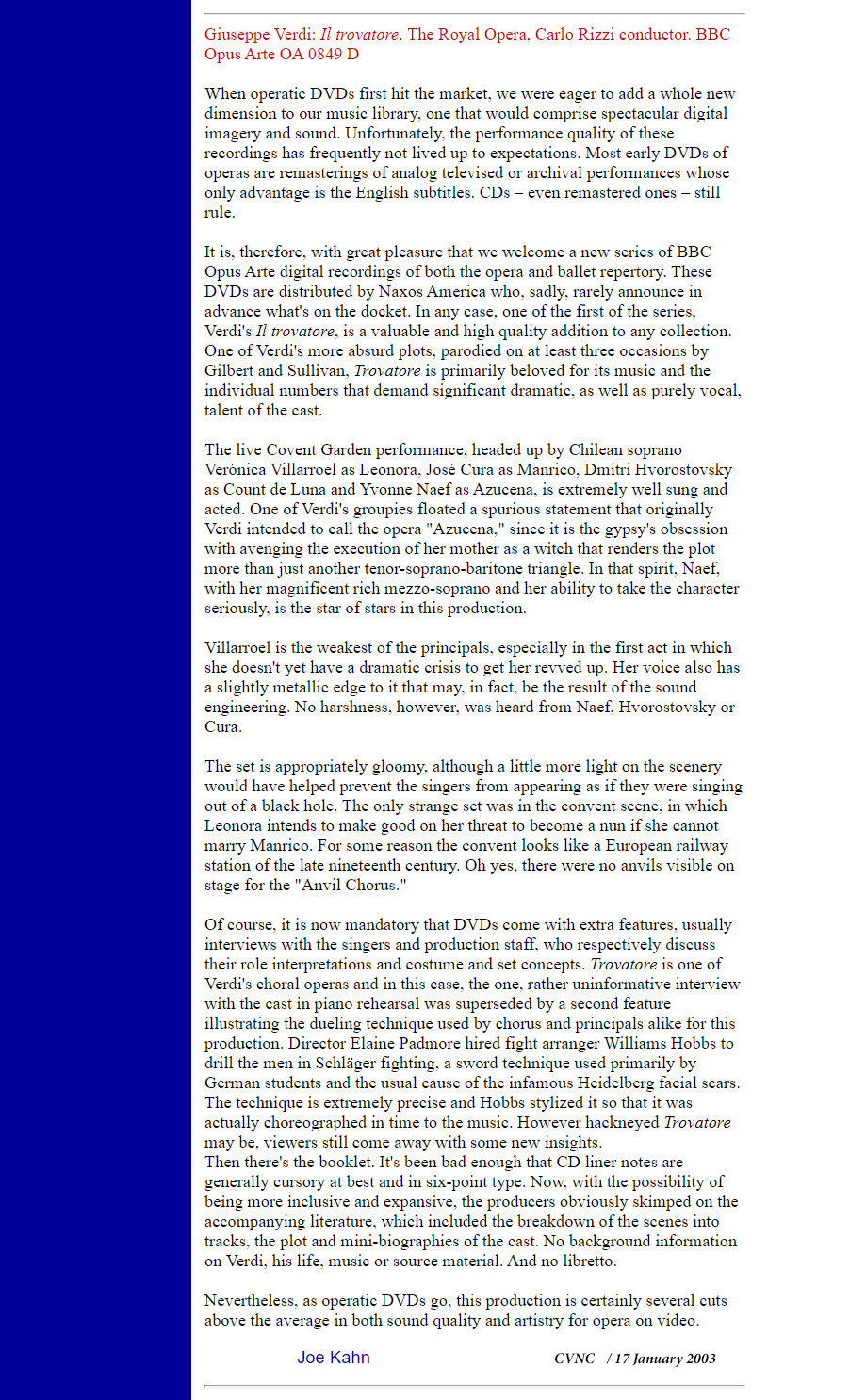
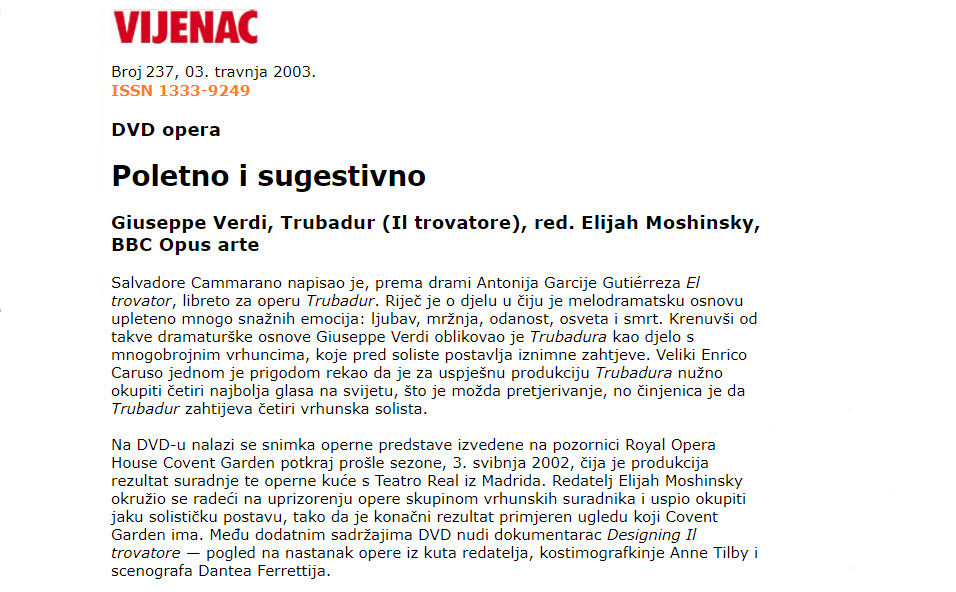
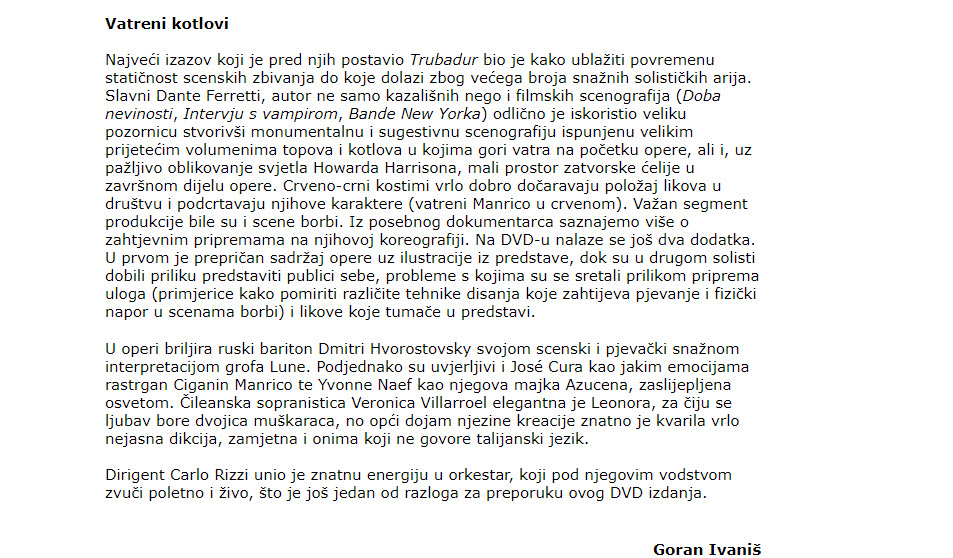
|
Note: This is a machine-based translation. We offer it only a a general guide but it should not be considered definitive.
Dashing and Suggestive Vijenac Goran Ivaniš 3 April 2003 [Excerpt] Salvadore Cammarano wrote, based on a play by Antonio Garcia Gutiérrez El trovador, a libretto for the opera Il Trovatore. It is a work whose melodramatic basis involves many powerful emotions: love, hate, loyalty, revenge and death. Starting from such a dramatic basis, Giuseppe Verdi shaped Il Trovatore as a work with many highlights, putting exceptional demands on soloists. The great Enrico Caruso once said that for the successful production of Il Trovatore it is necessary to bring togehter the four best voices in the world, which may be an exaggeration, but the fact is that Il Trovatore requires four top soloists. The DVD presents a recording of a Royal Opera House Covent Garden performance on May 3, 2002; the production was the result of that opera house's collaboration with Teatro Real in Madrid. Director Elijah Moshinsky surrounded himself with a group of top collaborators and managed to gather a strong solo line-up, so the final result is commensurate with the reputation of Covent Garden. Fire boilers The biggest challenge posed to them by Il Trovatore was how to mitigate the occasional static stage events that occurs naturally due to the large number of powerful solo arias. Dante Ferretti, famous for not only theatrical but also film sets (The Age of Innocence, Interview with the Vampire, Gangs of New York) made excellent use of the big stage by creating a monumental and suggestive scenery filled with threatening volumes of large cannons and cauldrons at the beginning of the opera as well as the careful design, lit by Howard Harrison, of the small prison cell space at the end the opera. The red and black costumes admirably evokes the position of the characters in society and underline their characters (fiery Manrico in red). There are several extras on the DVD. The first tells the content of the opera with illustrations from the play, while the second gives the soloists the opportunity to present themselves to the audience, the problems they encountered in preparing the roles (for example how to reconcile different breathing techniques required by singing and physical effort in fight scenes) and the characters which they interpret in the play. Russian baritone Dmitri Hvorostovsky excels with his stage presence and strong vocal interpretation of Count di Luna. Equally convincing are José Cura as the emotionally torn Gypsy Manrico and Yvonne Naef as his mother Azucena, blinded by revenge. Chilean soprano Veronica Villarroel is the elegant Leonora but the general impression of her creation has been significantly spoiled by very vague diction, noticeable even to those who do not speak Italian. Conductor Carlo Rizzi put considerable energy into the orchestra.
|
